#if Beale street could talk (the perfect novel)
Explore tagged Tumblr posts
Text
Thank you @figuringthengsout for tagging me <3333
rules: list ten books that have stayed with you in some way. don’t take but a few minutes, and don’t think too hard - they don’t have to be the “right” or “great” works, just the ones that have touched you
Soo tired it’s very late so I’ll be brief. In order I read them, not in order of importance to me
A Tree Grows in Brooklyn - every mother and her daughter should read. My first profound read.
Crime and Punishment - the triumph of my fourteenth year. The Quest for the Perfect Translation pt.1 (it’s Nicolas Slater’s version. You’re welcome)
Ordinary People - found a similar person in Conrad. And cried. A lot.
The Plague - hahaha covid. Incredible. Began my love of Camus and then I got into philosophy and then died a little bit
All Quiet on the Western Front - the most influential a book has been on my life. Started the WWI interest and got me into the trench poets and started my research paper and so much more
The metamorphosis - learned so much about disability and what my family is. Read it so many times.
Inferno - got me through a rough spot. The Quest for the Perfect Translation pt.2 (I SWEAR BY Dorothy L Sayers. She’s incredible)
Patrick Modiano Missing Person - I can’t even talk about this one except to say that it changed me and that I want to write like him
Eichmann in Jerusalem - began my love of nonfiction and journalism and my obsession with the guardian and the Atlantic and the New Yorker, etc and now I spend so much money on newspapers and magazines I blame Arendt and her terrific reporting.
I didn’t include any poetry plays or short fiction because that would be cheating. Would require a whole other list for those.
And, note, these are the books that impacted me profoundly. Not exactly pleasureful books I got into, how it works for me in fandom. That would, again, be another list. (Aftg, sherlock Holmes, Agatha Christie)
#oops that’s only 9 books#told you I was tired#honorary mentions:#Judith guest great house#if Beale street could talk (the perfect novel)#bastard out of Carolina#piranesi#the goldfinch!!!#maybe I should have written a longer list#dang and now I’m thinking about other nonfiction I’ve read for my paper#wwi and modern memory#among the plays would be#ros and guil are dead#(BEST EVER)#12 angry men#king lear#motive and the cue#crucible#short fiction is borges and Calvino all tha way!!!#shit if forgot about Calvino!!! baron in the trees and invisible cities are definitely top 10#just remembered about magical realism. shit there’s so many good ones…#bless me ultima. house of spirits. etc#poets are easier#rilke sassoon graves mostly#and Adrienne rich!!! of course!#those are my die hards#there’s so many books I’ve forgotten I just know it#it’s so hard to pick the most important to me#they all were SO important#me
3 notes
·
View notes
Text
Best Books of 2022
Best "I think you wrote Lois McMaster Bujold fanfic and I respect that" Novel: WINTER'S ORBIT.
Best "Oh shit THAT'S how foot binding works?!" Novel: IRON WIDOW.
Best Whale Ranking Novel: MOBY DICK.
Best Novel About Sperm: MOBY DICK.
Best Novel About a Cannibal: MOBY DICK.
Best Novel About Forced Self-Cannibalism: THE GRANDMASTER OF DEMONIC CULTIVATION.
Best Novel Recommended By A 10-Year-Old: THE GIRL WHO DRANK THE MOON.
Best Re-read of a Novel First Read as a 10-Year-Old: I WANT TO GO HOME!
Best End of the World Novel: THE LAST POLICEMAN.
Best Lesbian Romance Novel: HOW TO FIND A PRINCESS.
Best Romantic Accounting Novel: THE RUIN OF A RAKE.
Best Romance Novel With a Disaster Bi Lead: CHEF'S KISS.
Best Romance Novel Where the Protagonist Doesn't Know It's Romance: THE SCUM VILLAIN'S SELF-SAVING SYSTEM.
Best Fantasy Trilogy First Novel: THE STARDUST THIEF.
Best Fantasy-ish Trilogy: SON OF A TRICKSTER, TRICKSTER DRIFT, and RETURN OF THE TRICKSTER.
Best Fantasy Standalone Novel: THE SPEAR CUTS THROUGH WATER.
Best Use of Ringo Starr: THE EINSTEIN INTERSECTION.
Best Book You Read In High School But I Didn't: THE GREAT GATSBY.
Best Unionization Novel: SILK AND INSIGHT.
Best Story of a Complicated Man: THE ODYSSEY.
Best Short Story Collection Containing a Cake Recipe: MOIRA'S PEN.
Best Meta-non-fictional Fictional Review Collection: A Perfect Vaccuum.
Best Book By Someone Who Used To Live Nextdoor: HALFBREED.
Best Book Adapted Into An Orson Welles Film: THE TRIAL.
Best Use Of Dick Jokes: IF THIS BOOK EXISTS, YOU'RE IN THE WRONG UNIVERSE.
Best Rotting Nightmare Novella: NOTHING BUT BLACKENED TEETH.
The full list of competitors below.
Mister Impossible
Whispers Under Ground
The Serpent's Secret
Sabriel
Game of Stars
Lirael
Once Ghosted, Twice Shy
Abhorsen
A Snake Falls to Earth
Across the Wall: A Tale of the Abhorsen and Other Stories
Winter's Orbit
The Best of Gene Wolfe: A Definitive Retrospective of his Finest Short Fiction
Iron Widow
Tar Baby
Moby Dick
The Marrow Thieves
Popular Hits of the Showa Era
Heaven Official's Blessing (volume 2)
The Prince and the Puppet Thief
The Empress of Salt and Fortune
The Truth Is a Cave in the Black Mountains
When the Tiger Came Down the Mountain
The Door Into Summer
Spoiler Alert
The Great Gatsby
Wicked As You Wish
Halfbreed
Never Let Me Go
Can't Escape Love
In the Miso Soup
The Girl Who Drank the Moon
The Björkan Sagas
Artificial Condition
Starship Troopers
The Scum Villain's Self-Saving System (volume 2)
The Turn of the Screw and Other Stories
The Beautiful Ones
Every Living Thing
A Prince on Paper
Broken Homes
Grandmaster of Demonic Cultivation (volume 2)
The Last Policeman
Split Tooth
Lost in the Never Woods
The Three-Body Problem
Flip the Script
Bitter Gold Hearts
It All Comes Back to You
Mistress Masham's Repose
How to Find a Princess
I Want to go Home!
Woman Running in the Mountains
The Little Warrior (Jill the Reckless)
Son of a Trickster
The Einstein Intersection
Captive Prince
The Trial
Trickster Drift
Six German Romantic Tales
Return of the Trickster
If Beale Street Could Talk
Heaven Official's Blessing (volume 3)
Japanese Tales
Akata Warrior
Foxglove Summer
The Scum Villain's Self-Saving System (volume 3)
The Loophole
The Ruin of a Rake
Complicity
The Stardust Thief
The Hanging Tree
Beauty and the Besharam
Some Do Not ...
Grandmaster of Demonic Cultivation (volume 3)
The Joining of Dingo Radish
Prince's Gambit
The Spear Cuts Through Water
Chef's Kiss
Monkey Beach
The Hourglass Throne
She Who Became the Sun
The Strange Journeys of Colonel Polders
Heaven Official's Blessing (volume 4)
The Sunbearer Trials
The Toynbee Convector
Kings Rising
The Odyssey
Moira's Pen
Revenge
The Changeling
The Scum Villain's Self-Saving System (volume 4)
If This Book Exists, You're in the Wrong Universe
The Wolf and the Woodsman
The Husky and his White Cat Shizun (volume 1)
A Perfect Vacuum
It Takes Two to Tumble
Silk and Insight
In Deeper Waters
Nothing but Blackened Teeth
I Will Fear No Evil
#best of#books#i have posted some variant of this on every social media site#because i'm very obnoxious
3 notes
·
View notes
Text


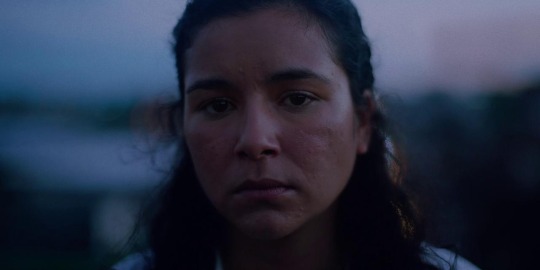
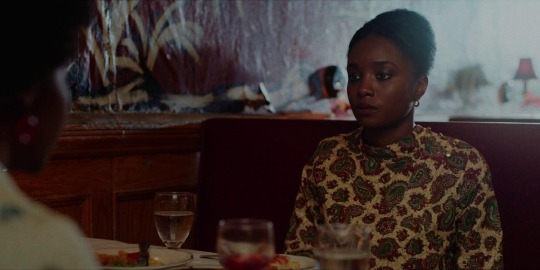
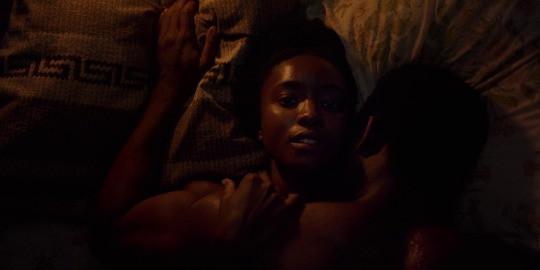

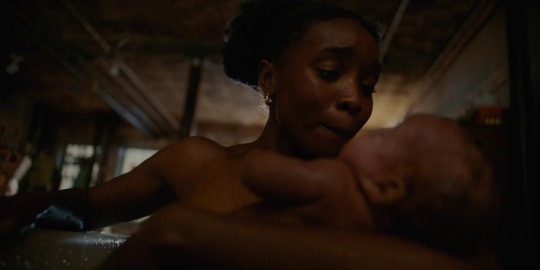


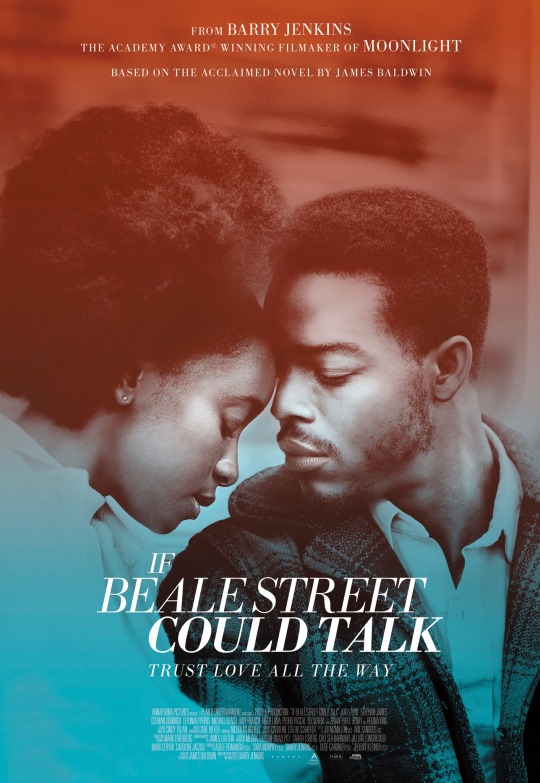
If Beale Street Could Talk (2018)
Thoughts on the film and novel. I read it before I saw it.
It's a different type of love story, one where the love is absolute. Usually you have a love story where one or more of the characters have to question "is this the one for me"? There is no room to question Tish and Fonny's love for each other. They have truly loved each other since they were kids. The real drama in the story is whether the world is gonna love them back and let them be together. Whether they'll get lucky or not, because it takes luck not to get fucked over by a system that excludes you. Will the racist, white-dominated society ever let up; and if not accept their existence, then at least be uninvolved/unaroused by it? No, they are aroused by it. The white men depicted in the film are just a reflection of reality in 1970s America and present-day. Their superiority complex is so baked into them by historical coincidence that many of them can't sit still nonviolently if a black person comes into their line of sight. And that's exactly the situation Fonny has to deal with in If Beale Street Could Talk. He was arrested by a white cop for a crime that he didn't commit, all because of his actual offense; walking home while black. It is as simple and cold as that. This might be James Baldwin's fictitious story but it's informed by a well sourced history of black oppression.
The big dilemma in the story is Fonny's imprisonment. To make matters more dire Tish informs her love that she is pregnant during one of her first visits at Fonny's jail. As stated before he was just minding his business one night when a cop decided Fonny fit the description for a suspect in a recent rape case. A young Puerto Rican woman was the victim of this heinous crime, but since it happened in the dead of night she didn't get a good look at who did it. The police department rounded up guys off the street and convinced young Victoria that Fonny was the one who did it. Part of the tragedy of Beale Street is the state pitting these two persecuted minorities against each other. The state has no 'real' proof to link Fonny to the crime. Unfortunately, as Tish's sister puts it in the book "We have to disprove the state's case. There's no point in saying that we have to make them prove it, because, as far as they're concerned, the accusation is the proof." Guilty until proven innocent. James Baldwin would probably be depressed but not surprised to find out not much has changed about the justice system in America.
What I find most gripping is the realness of the characters. Not just the young adults Tish & Fonny, but their families too. Tish's family has a crude vocabulary and domineering attitude towards anyone not in their corner. They, like many in their community, are jaded by the world they grew up in. They are just finding ways to cope and not explode. Not explode just for their families sake. For Fonny and the baby's sake. They love one another and to them that means speaking uncomfortable truths, like holding no punches when talking about the sins of white people. And sins not in the religious sense because their family justifiably has lost faith in any grand fairness that religions so often preach. Fonny's biological 'family' on the other hand drinks the Christian cool-aid hard. Well his mother and sisters do. They don't see Fonny's incarceration as an injustice, but as a consequence of his impurity. Impurity of having a child so young, marrying so young, not being pious enough, etc etc. The only family member that truly supports him is his father Frank. Baldwin is showing us through his characters that we're all imperfect. We are products of our circumstances and environment, like the wood Fonny crafts into sculptures. What perfect symbolism by Baldwin.
The innocence of this couple's love is something that really comes through in both the screen and the original novel. I did feel the film relied too heavily on its long silent stares between the protagonists. They're meant to evoke a love that is so powerful it needs no words, but after a while these scenes get too tedious and uninteresting. I think the film adaptation kept close to Baldwin's work though, but since I inevitably compare it to the novel I just feel it came short of being as powerful. Part of it could be just simply that this is James Baldwin’s story, not the director Barry Jenkins' original work (Like Moonlight was, and which I think is a 10 of 10 film). There was however one semi-big detail the film didn't adapt, and that's the presumed suicide of Fonny's father at the end of the drama. In my opinion that omission is very significant. It softens the power of the story. A thought I think now that describes the film overall. Jenkins himself hints at at in an interview with IndieWire that his film was more about the love story. I think Baldwin's original story is about hurt, hurt, and more hurt with love trying to survive it all. And Fonny's father committing suicide after facing the fact that his son is not getting out of prison is a crucial moment of that hurt. Baldwin obviously thought it was crucial because it’s literally the last thing that happens in the book. Presumably Baldwin's final reminder that historically a black life in America never really gets a happy ending.
P.S. My comments ended up being more on the book than the movie because at the moment that I'm writing this I recall the book more.
Also I thought the soundtrack was great and stood out as one of the best things about it.
https://www.indiewire.com/2018/11/if-beale-street-could-talk-barry-jenkins-james-baldwin-1202023517/
Rating: 6/10 (Just the film)
#anthrotographer#movie review#movies#film photography#film#movie poster#film review#screenshots#if beale street could talk#james baldwin#1970s#black film#based on novel#books and novels#black history#book vs movie#kiki layne#stephan james#regina king#nicholas britell#film music#fonny#tish
8 notes
·
View notes
Note
"I think all of us white girls should take to heart your advice about studying Black culture and Black history. Do you have anything in particular to recommend?"
Ok, I'll bite.
A great first book would be
Nell Irvin Painter's "Creating Black Americans: African-American History and Its Meanings, 1619 to the Present".
Also check out Angela Davis, WEB Du Bois, etc. Better yet, every white girl should go join a Black History class. Great place to meet black folk and if you shut up and listen, you'll learn a thing or two.
For novels, check out "Full Circle: The Road to Redemption" by Shawn Cole, Jean Toomer's "Cane" (a classic from the Harlem Renaissance), Chinua Achebe's "Things Fall Apart", anything by Richard Wright, Toni Morrison, James Baldwin.
Not gonna touch music except to say Elvis Presley wasn't the first or last big white artists to steal from black musicians. Otherwise, go find black songs to your taste. Oh, and listen to Tupac. Always Tupac.
In movies, check out anything by Jordan Peele and Spike Lee ("Da 5 Bloods" is a perfect antidote to any bros who think "Apocalypse Now" is all that). "If Beale Street Could Talk" is an underrated modern classic imo. Go proper classic and find out how old all these dating issues are "Look Who's Coming to Dinner". If you like thrillers, check out the amazing "In the Heat of the Night". Classics like "Shaft" (not the godawful remake) and "Sweet Sweetback's Baadasssss Song" are fun but probably beyond you (I think white folk misunderstand these films without cultural context). Watch "Dolemite Is My Name" first maybe. Oh, and if you like quirky hipster comedies, check out "Sorry to Bother You".
The main thing though is not to assume you know shit. Especially when you inevitably meet black folk who don't know all the "black culture" you do. Shut the fuck up already. We don't have to read up on it because we're fucking living it.
And don't give me that whiny white girl "oh but there aren't any classes where I am" or "oh but they're too expensive". You can take a FREE online course in African American history from fucking Yale university right here: https://oyc.yale.edu/african-american-studies/afam-162 All white folk (boys and girls) should start working through that course right now.
Thank you very much for putting this list together. Reposting it so my followers (boys and girls) can get inspired.

46 notes
·
View notes
Text
February 12, 2021: If Beale Street Could Talk (Review)
This one was tough emotionally...and a very good movie!
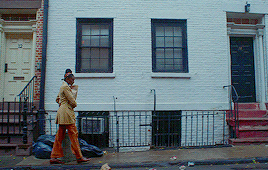
Fact of the matter is, this movie was not only topical, but also very well-made and acted. Makes me want to read James Baldwin’s novel one of these days, if I’m honest.
This film, at its very core, is a film about young love. And it does that VERY well, I gotta say. It captures the emotions and benchmarks of relationships, but is able to effectively balance that with the environment and politics of the times. It’s a downright masterpiece on that front. Oh, and by the way: NO INFIDELITY!!! WHOOOOOOOOOO! Hopefully THAT trend continues. Anyway, lemme get into my full thoughts on this movie, in the Review! Recap is here and here, if you wanna take a look!
Review
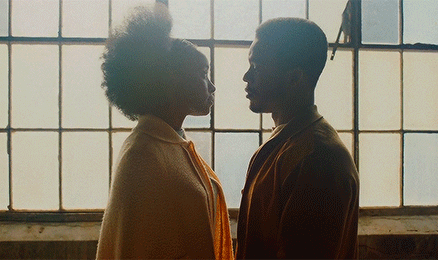
Cast and Acting: 9/10
Right off the bat, KiKi Layne and Stephan James have perfect chemistry. I mean it, this might have set my bar for perfect chemistry in film that’s actually consummated. Their past, while largely unseen, carries a lot of weight, and you can feel that every time the interact on the screen. What I’m saying is, they’re cute together, and I ship them hard. Yeah, I just said that, sue me. Here’s the things, though...individually, they’re only OK. Yeah, sorry, neither of them get a big chance to shine alone, and when they do, the film does most of the acting for them. When I say that, I think back to the perfume counter scene. It’s not KiKi’s acting that sells it for me, it’s the environment, the setting, the situation. Sorry to say it...but I kind of get why they weren’t nominated for Best Actress and Actor. NOT THAT THEY AREN’T GOOD. THEY ARE GREAT. But they aren’t really stellar alone, is what I’m saying.
Most of the supporting cast is also fantastic, even if some of them don’t get nearly as much time. Teyonah Parris, whom I’ve been enjoying THOROUGHLY in WandaVision, does a great turn as Ernestine, while Colman Domingo and Michael Beach are great as the fathers, even if their plot line sort of drops off. Even Aunjanue Ellis is good in her brief appearance as Fonny’s mom, and Brian Tyree Henry’s monologue about prison, and Emily Rios’ about rape are...hauntingly good. Ah, but wait...I’m forgetting someone, aren’t I?
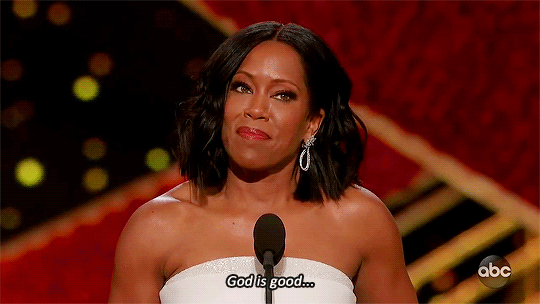
REGINA FUCKING KING EVERYBODY. This woman ABSOLUTELY deserved Best Supporting Actress, and was WITHOUT A SINGLE DOUBT the best actor in the film. My Lord, she was amazing, and I’m really happy that she’s finally been able to carve an illustrious career in the 2010s. Seriously, she’s been acting since the ‘90s, and I feel like she’s only come to prominence in the last 10 years or so. Which sucks, because I’ve known about her since WAY before that, and it’s really nice to see her in the spotlight. WHOO!
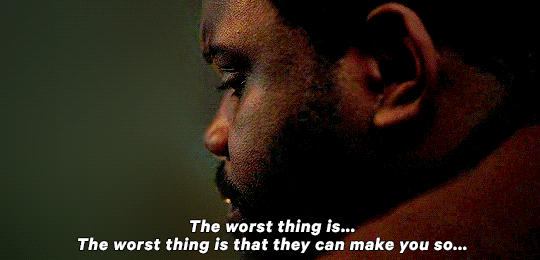
Plot and Writing: 10/10
Y’know, the plot was a legitimate surprise to me. I guess that, after this month, I’ve been expecting happy endings and all that. But this ending was...bittersweet, and not even really that. Which is by absolutely no means a bad thing, just to be clear. No, this film was a touching diatribe on young love’s intersection with an unfair society, while also serving as a look at racial politics in the past, and serving as a harsh lens on today’s world as well. Barry Jenkins is the one who adapted James Baldwin’s novel into the screenplay, and...yeah, it’s fantastic. Moving, insightful, affecting, hertbreaking, you name it.
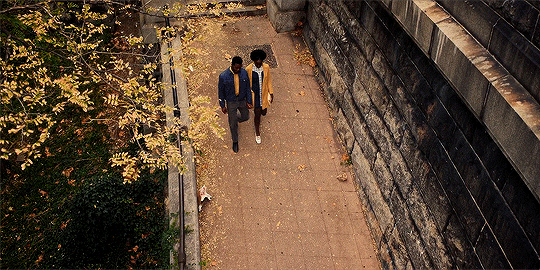
Directing and Cinematography: 9/10
Barry Jenkins, man. I was going to watch his other film Moonlight this month, but I’m putting off for another month to make room for some other films. But this film LOOKS gorgeous. There’s too much to go into in terms of how many good shots there are here, but one of these scenes was good enough to win Regina King the Oscar. Which does bring something up, though. HOW DID THIS FILM GET SNUBBED SO HARD
Look, I liked Black Panther as much as the next guy, BUT IT WASN’T BETTER THAN THIS MOVIE. And yet, it got nominated for a Best Picture Oscar, and THIS MOVIE DIDN’T? Not just that, but it didn’t get nominated for Best Director OR Best Cinematography (by James Laxton)? The Oscars are BULLSHIT, full stop.

Production and Art Design: 8/10
But I will say, this film wasn’t as good as Black Panther in Production and Art Design, but that’s because those categories were basically perfect in Black Panther. I tell you, if that movie had NOTHING ELSE going for it (and it did, hello Eric Killmonger), it had the look. But, that said, Beale Street still deserved a nomination at least! I mean, this film looks fantastic, no complaints. Well...one complaint. It really wasn’t very ‘70s to me. It was, sure, but it could’ve passed for other time periods easily. Definitely very good...but not perfect.

Music and Editing: 9/10
Fun fact! Nicholas Britell was brought on to this project after previously working on Moonlight with Barry Jenkins. This score took a lot of tinkering, but was meant to revolve around the ideals of love. In fact, some of the pieces are named after the Greek forms of love. You know, philia, agape, etc.? Neat, right? Anyway, the work shows, as not only did it get nominated for Best Original Score (which it lost to...Black PantherCOMEON), but it’s also quite an impactful score on its own. While it’s nt soundtrack-worth for me, it’s still extremely memorable, and I’d recognize it upon hearing it. So, yeah, nice one, Britell!

90%! And it’s well-deserved.
This was a beautiful movie, and it really did move me. I mean, it’s not like it’s changed my opinions about anything; in fact, it’s really just strengthened them, but it’s still a gorgeous movie. And outside of the sociopolitical folderol, this film has a gorgeous portrait of love that I can’t ignore, and won’t forget for a while. Fantastic.
And as for period romances...let’s take a break, huh? Let’s go for something set while the film was made, but also along the lines of a traditional love story. We are getting close to Valentine’s after all.

February 13, 2021: Before Sunrise (1995)
#if beale street could talk#barry jenkins#kiki layne#stephan james#regina king#teyonah parris#colman domingo#brian tyree henry#ed skrein#ichael beach#emily rios#aunjanue ellis#romance february#user365#365 movie challenge#365 movies 365 days#365 Days 365 Movies#365 movies a year#supernovass#userrobin#doyouevenfilm#batwan#useraina
11 notes
·
View notes
Note
Hi you... if you were going to curate a little season of films for me, which ones would you choose and why? They don't need to be horror, I'm just curious what you would choose 🌸
I don’t know if you’ll like these movies, or if you’ve already watched them, but after i watched these films, i felt like they might need to belong to you now. i hope they make you smile, roll your eyes, and cry just as much as i did.
1. city of god (2002): this is one of the most immersive and gorgeously shot films i’ve ever seen. it’s set in rio de janeiro during the 60s and spans decades exploring the drug culture in the slums and how this can affect kids just as they are trying to figure their own selves out. the way this film is shot, feels like you were at the sea with them as the sand crunched underneath your feet. but the way that the director captures these individuals, makes you so fucking relieved that you don’t live through any of the circumstances that they go through.
2. the dreamers (2004): set in 1968, this film follows three students in Paris who come of age and explore one another and their limits during the revolution. while these students prop themselves up as individuals obsessed with sex, running underneath themselves is a current of jealousy, obsession, and blurred familial relationships that made me increasingly uncomfortable. you find yourself feeling bad for the children, and ultimately upset at their upbringing because of their parents.
3. if beale street could talk (2018): this movie is based off of james baldwin’s titular 1974 novel. in it, the director expertly and vigorously explores love: a love that feels so real that it hurts. the cast is what sold this film to me. the way they talk, laugh, cry, and smile at one another is achingly beautiful and terrifyingly sad. i wanted to transport myself back to their time period and watch the main characters fall in love because the film didn’t seem like enough.
4. the neon demon (2016): this film follows an emerging model who sacrifices herself to the demands of the industry in order to be attractive and beautiful. there are so many stunning colors in this film that it makes you dizzy, like you’re in a trance and that’s what this world is for the main character: a trance. as she oscillates between reality and fantasy, her world and the characters in it, increasingly seek out to alter her personality.
5. death becomes her (1992): a deliberately ultra-campy parody of trashy, pandering "women's pictures," soap operas and paperbacks from the '80s and '90s. The three leads all do some of their best work - it's hilarious watching Meryl Streep play a terrible actress, Goldie Hawn is particularly hilarious during her character's cat lady phase, and all around just a really fun and eccentric film.
6. princess cyd (2017): i can’t think of anything to write for this but i just wanna say that this is literally one of the most pleasant movie experiences i’ve ever had. so much light and genuine interaction in warm sun rays radiating positive energy and an openness that is far too uncommon in movies nowadays. people talk, people connect, people grow bonds and are allowed to be sexual or intimate or personal without an air of shame or judgement. just pure kind and curious human association.
7. spiderman: into the spiderverse (2018): the message of Spider-Verse is not "gentrify yourself! stop expressing your personality and just conform to what society wants you to be!" After all, what makes you different makes you Spider-Man, and Miles' final expression of himself as a superhero still retains much of his personality and individuality...they're just being used in more productive and fulfilling ways. It's the little things that drive the point home, like noticing that the title page for Miles' finished Great Expectations essay has been stylistically doodled and colored like street art. Rather than seeing his artistic gifts as an opposition to his schoolwork, Miles infuses them together to make the best of the hand he's been dealt.
8. my life as a zucchini (2016): initially heartbreaking and sad, but slowly becoming more joyful and heartwarming as the plot moves along. The film really feels like it captures the essence and child like wonder of these kids, all of them going through hardships but managing to find something to help each other out. It’s so refreshing to see the actual orphanage portrayed in a more positive light, not the usual horrid dump that a lot of lesser movies play them out as. The animation is stunning. One of the best uses of stop motion I’ve seen, everything is so colourful and detailed. There’s some moments set in snowy mountains and these look incredible. There’s clearly been so much love and care put into each and every scene here. The music too, sounds spectacular, it really works well with each scene.
9. lovesong (2016): Mindy and Sarah have that type of relationship where they don't need words because they speak in a language made out of glances and touches. This movie is about the fear of ruining a meaningful friendship and losing an important person, about love that is so complicated that one might not even try because the outcome seems to be so obvious.
10. her (2013): Heartbreak is formative: it changes you heart side out, and leaves your muscles a little stronger, your skin a little thicker, your bones easier to repair. Before this film, I’d never seen anything constructive in having your insides pulled apart by the seams by another person, but this film taught me how. Being in love and then being forced out of it is an experience that changes you fundamentally, but Her taught me its purpose – you don’t need them to leave you so that you can find someone who’s a better fit, because perhaps you never will. You need it to participate in humanity. The common denominator is being hurt, and without it, you’re barely alive.
11. shoplifters (2018): bittersweet and richly transportive, Shoplifters is a film that nonchalantly eases you into its tragic beauty in a way that doesn't punch you hard until the end. It simultaneously made me want to be part of the film's world and also very glad that I'm not. The setting the characters live in is messy and cluttered and full of dysfunction and lies, but it's also got family, and laughter, and fist-bumps, and slurping warm noodles while rain pings on the tin rooftop. So nuanced, so many tiny moments of delicate beauty and unassuming heartbreak, so many people making terrible decisions with good intentions.
12. god’s own country (2017): though it is a love story between two men, this aspect is only addressed briefly in a single scene. Rather, the film is about finding someone who makes you want to be a better person, someone who comes into your life just when you needed it most. Gheorghe helps Johnny open up and realize the beauty of the simple life. From this relationship, Johnny begins to feel comfortable with expressing himself, and his love and gratitude towards others. He also begins to appreciate life in the country, surrounded by stunning landscapes and the beauty of simplicity. Addressing the Yorkshire countryside, Gheorghe says "It is beautiful, but lonely." Johnny is presented with the notion that he doesn't have to be cold and miserable, slaving and drinking his days away. He is presented with the possibility of no longer being alone and finally finding happiness and contentment - and it is more than gratifying to see him accept it.
13. disobedience (2017): a tender star-crossed daydream. the three main character dynamics are special enough on their own, but the romance that blooms at the center is cathartically intimate and even magical: a reunion that feels so inevitable. catching glimpses of a past life, details we aren’t privy to. all the stolen kisses and whispers and promises. a bond so strong that they fall back in sync with each other like second nature, even if they try to fight against it. even if it won’t work. and yet they choose each other, even if for a few minutes.
14. raw (2016): this film is so gross and I like that. There is tons of blood and unique body horror and it all works perfectly for the tone the film is attempting to set. The use of color, specifically neons, creates a constant feeling that you are traveling through some sort of weird ghost world, which I really like. Overall, it's a very well put together film with flashes of brilliance.
15. the night is short, walk on girl (2017): what an absolutely magical adventure of a film. Essentially this is a heavily episodic look at a night in the lives of several people, centered on a woman and a man as she gleefully floats from event to event while he neurotically obsesses over how to "coincidentally" talk to her. The storytelling is incredible; while the overarching narrative is simple there are countless threads woven together to connect everyone in the story to each other. That in itself is a big theme: connections between people, how everything is interrelated, and what a large impact seemingly insignificant things people do can have an impact on everyone around them.
16. coraline (2009): Coraline is the best stop motion movie ever made in my opinion. Before the film released in 2009, I read the book and was completely blown away by its creativity and story. It’s a pretty dark tale featuring many scenes of fright that work well in both a horror setting and an animated kids setting. On surface value, this film is quite horrifying, which is something I’ve always loved about it. While it does make a few minor changes to the book, it improves upon a piece of art that was already jaw-droppingly good. Coraline feels like a real little girl with some real problems. She’s selfish but likable which is something most films cannot translate well. Of course, she has a pretty awesome arc as well which brings this movie to a perfect close for her character. The other-mother is also perfectly done. She is almost exactly how I imagined her in the book and the animation on her is spookily gorgeous. There is not one dull moment in this film. It is literally a perfect piece of cinema.
17. the third wife (2019): haven’t seen a film this visually delicate in a while. Ash Mayfair works with the looming mountain surroundings to make her characters —these women, these girls— as small as possible, as isolated as possible. Uneasiest of all is the protagonist May, so young and so weighed by responsibility, her position blurs between being one of the wives and being one of the daughters. It’s an extremely bleak tale of circumstance. An old tale, certainly, but so beautifully crafted it doesn’t matter. Mayfair holds a fearful tension throughout, and it only ever shatters in the cruelest of ways.The abundance of women and display of sisterhood begin as a comfort, but horror takes over as we realize how conditional and fragile that comfort is. Even the daughters are subconsciously aware, one of them praying to the gods to grow up and become a man, shearing her hair off in naive triumph. It’s a doomed cycle of girls performing roles which are unfortunately their best option, right up until the final scene of May with her daughter, still in their mourning clothes. She, like the older wives, finally realizes they’re the same as the cattle laying on their side for too many days.
6 notes
·
View notes
Note
Tell us your three most favorite writers please
Following you was one of my greater tumblr moments 🙏🏾
I can’t give you three, and I can barely limit it to five, but I’m going to give you five instead.
1. Amiri Baraka

Amiri’s voice is the voice that consistently pushes me when I’m writing poetry and that internal voice says “that might hurt some feelings of folks you don’t know.” His voice is what pushes me past that. In any class I can, I try to weave in Somebody Blew Up America into the curriculum.
2. bell hooks

bell hooks, to me, is the perfect model of what it means to be able to write accessibly for the people but also withstand and thrive in writing for academia. I think any course, education, lesson in feminism that doesn’t include work and words from bell hooks is not a course in feminism at all. bell is one of the most moving writers I have been able to experience. Her words are the equivalent of drinking slightly chilled water - it’s crisp when it initially hits you, but it is so smooth when you take it in and you don’t even second guess needing more.
3. James Baldwin

My mentor told me once that were I to go get my Ph.D from a PWI, there are tons of universities that will question your legitimacy in black literature if you’re not studying Baldwin. I think that’s both indicative of white exclusion but also his power. I think The Fire Next Time should be required reading and stories like Sonny’s Blues and If Beale Street Could Talk have a beautiful way of depicting love and suffering without a typical narrative arc to end it. He defies a lot of grammatical rules and does so fluently and eloquently. I love his voice.
4. Patrisse Khan-Cullors

I’m including Patrisse because When They Call You a Terrorist is probably the best book I’ve read in this decade. It’s her only book, and she subscribes to being an activist more than a writer, but I think her book should be required reading. For tons of reasons. She does something similar to Baldwin with how she manipulates clauses and grammar rules, and she does it seamlessly. Her story is so powerful that I find a way to teach it in any class I have - basic skills or advanced.
5. Ken Follett

The white dudes start weaving themselves in at this point lol But if you haven’t read Pillars of the Earth, I think you are missing out on what it means to experience character development in a novel. I have read a lot of books. Pillars of the Earth is somewhere around 1,250 pages, depending on which version you get. I have never read a book that long that had the level of character development, scene building, narrative arc disruption, and thematic exploration all so well done in that long of a book. Usually books that long drag. It’s like a 4 hour movie. At some point, they drag. But Pillars of the Earth doesn’t drag. It grips. And Ken has this way with his words that can hold you in ways you didn’t think was possible. It’s a beautiful thing.
Obviously, I could go on and on. But this is a start. ☺️🙏🏾
20 notes
·
View notes
Text
books I read in 2019 (not including rereads, favorites are bolded!)
Come Close - Sappho
Shanghai Baby - Wei Hui
Twenty Love Poems and a Song of Despair - Pablo Neruda
Bad Feminist: Essays - Roxane Gay
The Mother of Black Hollywood: A Memoir - Jenifer Lewis
Sula - Toni Morrison
Reinventing the Enemy’s Language: Contemporary Native Women’s Writings of North America - ed. Joy Harjo and Gloria Bird
How to Write an Autobiographical Novel - Alexander Chee
Night Sky With Exit Wounds - Ocean Vuong
If They Come For Us - Fatimah Asghar
Heart Berries: A Memoir - Terese Marie Mailhot
Less - Andrew Sean Greer
The Astonishing Color of After - Emily X.R. Pan
Goodbye, Vitamin - Rachel Khong
Darius the Great is Not Okay - Adib Khorram
Exit West - Mohsin Hamid
Homegirls and Handgrenades - Sonia Sanchez
Heavy: An American Memoir - Keise Laymon
All You Can Ever Know - Nicole Chung
Unaccustomed Earth - Jhumpa Lahiri
The Wife Between Us - Greer Hendricks and Sarah Pekkanen
The Way You Make Me Feel - Maureen Goo
A Very Large Expanse of Sea - Tahereh Mafi
Water By the Spoonful - Quiara Alegría Hudes
I Can’t Date Jesus: Love, Sex, Family, Race, and Other Reasons I’ve Put My Faith in Beyoncé - Michael Arceneaux
Bury It - Sam Sax
White Dancing Elephants - Chaya Bhuvaneswar
Pulp - Robin Talley
Shit is Real - Aisha Franz
Silencer - Marcus Wicker
Forget Sorrow: An Ancestral Tale - Belle Yang
Bestiary: Poems - Donika Kelly
Monster Portraits - Sofia Samatar
No Matter the Wreckage - Sarah Kay
Violet Energy Ingots - Hoa Nguyen
Olio - Tyehimba Jess
The Kane Chronicles: The Serpent’s Shadow - Rick Riordan
There Are More Beautiful Things Than Beyoncé - Morgan Parker
Nylon Road: A Graphic Memoir of Coming of Age in Iran - Parsua Bashi
The Wedding Date - Jasmine Guillory
Fruit of the Drunken Tree - Ingrid Rojas Contreras
An American Marriage - Tayari Jones
Family Trust - Kathy Wang
Not That Bad: Dispatches from Rape Culture - ed. Roxane Gay
Little & Lion - Brandy Colbert
A Girl Like That - Tanaz Bhathena
Suicide Club: A Novel About Living - Rachel Heng
The Disturbed Girl’s Dictionary - NoNieqa Ramos
My Old Faithful: Stories - Yang Huang
Crazy Rich Asians - Kevin Kwan
Girls Burn Brighter - Shobha Rao
Moon of the Crusted Snow - Waubgeshig Rice
Kingdom Animalia - Aracelis Girmay
Happiness - Aminatta Forna
Devotions - Mary Oliver
The Proposal - Jasmine Guillory
The Kiss Quotient - Helen Hoang
When Katie Met Cassidy - Camille Perri
Heads of the Colored People - Nafissa Thompson-Spires
Friday Black: Stories - Nana Kwame Adjei-Brenyah
The Word is Murder - Anthony Horowitz
Miles from Nowhere - Nami Mun
The Lost Ones - Sheena Kamal
All the Names They Used for God - Anjali Sachdeva
Confessions of the Fox - Jordy Rosenberg
Love, Loss, and What We Ate: A Memoir - Padma Lakshmi
On the Come Up - Angie Thomas
The Guernsey Literary and Potato Peel Pie Society - Mary Ann Shaffer and Annie Barrows
The Love & Lies of Rukhsana Ali - Sabina Khan
See What I Have Done - Sarah Schmitt
Convenience Store Woman - Sayaka Murata
I Am Not Your Perfect Mexican Daughter - Erika Sánchez
For Today I Am A Boy - Kim Fu
The Seven Husbands of Evelyn Hugo - Taylor Jenkins Reid
Conflict Resolution for Holy Beings - Joy Harjo
They Can’t Kill Us Until They Kill Us - Hanif Abdurraqib
Mongrels - Stephen Graham Jones
If Beale Street Could Talk - James Baldwin
Death of Innocence: The Story of the Hate Crime that Changed America - Mamie Till-Mobley and Christopher Benson
The Gilded Wolves - Roshani Chokshi
To All the Boys I’ve Loved Before - Jenny Han
The Perfect Nanny - Leila Slimani, translated by Sam Taylor
The Travelling Cat Chronicles - Hiro Arikawa, translated by Philip Gabriel
Things We Lost in the Fire - Mariana Enríquez, translated by Megan McDowell
Sunburn - Laura Lippman
The House of Impossible Beauties - Joseph Cassara
Freshwater - Akwaeke Emezi
A Private Life - Chen Ran, translated by John Howard-Gibbon
Invisible: The Forgotten Story of the Black Woman Lawyer Who Took Down America’s Most Powerful Mobster - Stephen L. Carter
Undead Girl Gang - Lily Anderson
They Both Die at the End - Adam Silvera
The Friend - Sigrid Nunez
Severance - Ling Ma
Tiny Crimes: Very Short Tales of Mystery & Murder - ed. Licoln Michel and Nadxieli Nieto
Mapping the Interior - Stephen Graham Jones
Give Me Some Truth - Eric Gansworth
How to Love a Jamaican - Alexia Arthurs
All of This is True - Lygia Day Peñaflor
Swimmer Among the Stars - Kanishk Tharoor
The Wicked + the Divine, Vol. 7: Mothering Invention - Kieron Gillen and Jamie McKelvie
This is Kind of an Epic Love Story - Kheryn Callender
Gingerbread - Helen Oyeyemi
Where the Dead Sit Talking - Brandon Hobson
The Ensemble - Aja Gabel
My Education - Susan Choi
More Happy than Not - Adam Silvera
Nobody Cares: Essays - Anne T. Donahue
Kiss and Tell: A Romantic Résumé, Ages 0 to 22 - Marinaomi
Oculus: Poems - Sally Wen Mao
Let’s Talk About Love - Claire Kann
History is All You Left Me - Adam Silvera
Opposite of Always - Justin A. Reynolds
The Crown Ain’t Worth Much - Hanif Abdurraqib
The Weight of Our Sky - Hanna Alkaf
If You See Me, Don’t Say Hi - Neel Patel
Girls of Paper and Fire - Natasha Ngan
What if It’s Us - Becky Albertalli and Adam Silvera
The Map of Salt and Stars - Jennifer Zeynab Joukhadar
October Mourning: A Song for Matthew Shepard - Lesléa Newman
The Big Smoke - Adrian Matejka
Dissolve - Sherwin Bitsui
The Woman Next Door - Yewande Omotoso
The Refugees - Viet Thanh Nguyen
White Tears - Hari Kunzru
Electric Arches - Eve Ewing
The Black Maria - Aracelis Girmay
Bloodchild and Other Stories - Octavia Butler
Soft Science - Franny Choi
The White Card - Claudia Rankine
Mad Honey Symposium - Sally Wen Mao
The Care and Feeding of Ravenously Hungry Girls - Anissa Gray
Next: New Poems - Lucille Clifton
The Marvelous Arithmetics of Distance: Poems 1987-1992 - Audre Lorde
Quilting the Black-Eyed Pea: Poems and Not Quite Poems - Nikki Giovanni
The Arab of the Future - Riad Sattouf
Ghosts in the Schoolyard: Racism and School Closings on Chicago’s South Side - Eve L. Ewing
Gruel - Bunkong Tuon
Marriage of a Thousand Lies - SJ Sindu
Parable of the Sower - Octavia Butler
Good Night, Willie Lee, I’ll See You in the Morning - Alice Walker
That Kind of Mother - Rumaan Alam
Erotic Stories for Punjabi Widows - Balli Kaur Jaswal
Hera Lindsay Bird - Hera Lindsay Bird
Queenie - Candice Carty-Williams
And Still I Rise - Maya Angelou
The Man Who Shot Out My Eye Is Dead - Chanelle Benz
Everyone Knows You Go Home - Natalia Sylvester
Naming Our Destiny: New and Selected Poems - June Jordan
The 100* Best African American Poems (*But I Cheated) - ed. Nikki Giovanni
The Haunting of Tram Car 015 - P. Djèlí Clark
Bury My Clothes - Roger Bonair-Agard
Selected Poems - Langston Hughes
Their Eyes Were Watching God - Zora Neale Hurston
Sonata Mulattica - Rita Dove
Winnie - Gwendolyn Brooks
Bicycles: Love Poems - Nikki Giovanni
The Black God’s Drums - P. Djèlí Clark
Kid Gloves: Nine Months of Careful Chaos - Lucy Knisley
Annie Allen - Gwendolyn Brooks
Parable of the Talents - Octavia Butler
After Disasters - Viet Dinh
Passing for Human: A Graphic Memoir - Liana Finck
Teeth - Aracelis Girmay
A Surprised Queenhood in the New Black Sun: The Life & Legacy of Gwendolyn Brooks - Angela Jackson
Peluda - Melissa Lozada-Oliva
A Map to the Next World - Joy Harjo
Magical Negro - Morgan Parker
Corpse Whale - dg nanouk okpik
Hawkeye: Volume 1 - Matt Fraction
Cenzontle - Marcelo Hernandez Castillo
Don’t Let Me Be Lonely: An American Lyric - Claudia Rankine
Selected Poems - Gwendolyn Brooks
She Had Some Horses - Joy Harjo
The BreakBeat Poets: New American Poetry in the Age of Hip-Hope - ed. Kevin Coval, Quraysh Ali Lansana, and Nate Marshall
Beyond Uhura: Star Trek and Other Memories - Nichelle Nichols
The Past and Other Things that Should Stay Buried - Shaun David Hutchinson
Difficult Women - Roxane Gay
The Woman Who Fell From the Sky - Joy Harjo
The Collected Schizophrenias: Essays - Esmé Weijun Wang
Go Ahead in the Rain: Notes to A Tribe Called Quest - Hanif Abdurraqib
The Frolic of the Beasts - Yukio Mishima
Hawkeye Omnibus - Matt Fraction
Good Talk: A Memoir in Conversations - Mira Jacob
Karamo: My Story of Embracing Purpose, Healing, and Hope - Karamo Brown
Tipping the Velvet - Sarah Waters
When My Brother Was an Aztec - Natalie Diaz
Toxic Flora: Poems - Kimiko Hahn
Virgin - Analicia Sotelo
Easy Prey - Catherine Lo
Laura Dean Keeps Breaking Up With Me - Mariko Tamaki and Rosemary Valero-O’Connell
Saints and Misfits - S.K. Ali
Intercepted - Alexa Martin
Love from A to Z - S.K. Ali
Gemini - Sonya Mukherjee
The Atlas of Reds and Blues - Devi S. Laskar
My Brother’s Husband Vol. II - Gengoroh Tagame
Black Queer Hoe - Britteney Black Rose Kapri
Internment - Samira Ahmed
Dothead: Poems - Amit Majmudar
With the Fire On High - Elizabeth Acevedo
Sabrina & Corina: Stories - Kali Fajardo-Anstine
Milk and Filth - Carmen Giménez Smith
The Key to Happily Ever After - Tif Marcelo
If You’re Out There - Katy Loutzenhiser
Farewell to Manzanar - Jeanne Wakatsuki Houston
New Poets of Native Nations - ed. Heid E. Erdrich
Bodymap: Poems - Leah Lakshmi Piepzna-Samarasinha
Wolf by Wolf - Ryan Graudin
Tell Me How It Ends - Valeria Luiselli
Born a Crime: Stories from a South African Childhood - Trevor Noah
Down and Across - Arvin Ahmadi
The Tradition - Jericho Brown
About Betty’s Boob - Vero Cazot and Julie Rocheleau
Fake It Till You Break It - Jenn P. Nguyen
Storm of Locusts - Rebecca Roanhorse
Silver Sparrow - Tayari Jones
Pride, Prejudice, and Other Flavors - Sonali Dev
Mongrel: Essays, Diatribes, Pranks - Justin Chin
When I Grow Up I Want To Be a List of Further Possibilities - Chen Chen
The New Testament - Jericho Brown
Fumbled - Alexa Martin
If It Makes You Happy - Claire Kann
Brave Face - Shaun David Hutchinson
Words in Deep Blue - Cath Crowley
Lost Children Archive - Valeria Luiselli
Care Work: Dreaming Disability Justice - Leah Lakshmi Piepzna-Samarasinha
We Were Eight Years in Power: An American Tragedy - Ta-Nehisi Coates
Anger is a Gift - Mark Oshiro
The Bride Test - Helen Hoang
Not Your Backup - C.B. Lee
Prelude to Bruise - Saeed Jones
The Night Wanderer: A Graphic Novel - Drew Hayden Taylor and Michael Wyatt
Naturally Tan - Tan France
Bloom - Kevin Panetta and Savanna Ganucheau
Like a Love Story - Abdi Nazemian
I’m Afraid of Men - Vivek Shraya
Juliet Takes a Breath - Gabby Rivera
On Earth We’re Briefly Gorgeous - Ocean Vuong
Let Me Hear a Rhyme - Tiffany D. Jackson
I Wanna Be Where You Are - Kristina Forest
Hurricane Season - Nicole Melleby
Split Tooth - Tanya Tagaq
Hungry Hearts: 13 Tales of Love and Food - ed. Elsie Chapman and Caroline Tung Richmond
The Night Tiger - Yangsze Choo
Long Live the Tribe of Fatherless Girls - T Kira Madden
Miracle Creek - Angie Kim
Ayesha at Last - Uzma Jalaluddin
Shout - Laurie Halse Anderson
The Breakbeat Poets Vol. 3: Halal if You Hear Me - ed. Fatimah Asghar and Safia Elhillo
The Tenth Muse - Catherine Chung
This Place: 150 Years Retold - various authors
Kings, Queens, and In-Betweens - Tanya Boteju
Midnight Chicken (& Other Recipes Worth Living For) - Ella Risbridger
Library of Small Catastrophes - Alison C. Rollins
Natalie Tan’s Book of Luck and Fortune - Roselle Lim
No Ashes in the Fire: Coming of Age Black and Free in America - Darnell L. Moore
The Book of Delights - Ross Gay
The 7 1/2 Deaths of Evelyn Hardcastle - Stuart Turton
Speak No Evil - Uzodinma Iweala
How We Fight White Supremacy - Akiba Solomon and Kenrya Rankin
A Love Story Starring My Dead Best Friend - Emily Horner
Here and Now and Then - Mike Chen
The Ghost Bride - Yangsze Choo
Red White and Royal Blue - Casey McQuiston
Becoming - Michelle Obama
The Wedding Party - Jasmine Guillory
Magic for Liars - Sarah Gailey
I’ll Be Gone in the Dark: One Woman’s Obsessive Search for the Golden State Killer - Michelle McNamara
Brain Fever - Kimiko Hahn
Life on Mars - Tracy K. Smith
Notebooks of a Chile Verde Smuggler - Juan Felipe Herrera
Catalog of Unabashed Gratitude - Ross Gay
Tentacle - Rita Indiana
Hapa Tales and Other Lies: A Memoir About the Mixed Race Hawai’i That I Never Knew - Sharon Chang
Loose Woman - Sandra Cisneros
Duende - Tracy K. Smith
Mostly Dead Things - Kristen Arnett
1919 - Eve L. Ewing
Why I’m No Longer Talking to White People About Race - Reni Eddo-Lodge
Negroland - Margo Jefferson
For Black Girls Like Me - Mariama J. Lockington
Super Extra Grande - Yoss
Home Remedies - Xuan Juliana Wang
You Can’t Touch My Hair: And Other Things I Still Have to Explain - Phoebe Robinson
An Anonymous Girl - Greer Hendricks and Sarah Pekkanen
The Abundance - Amit Majmudar
I Shall Not Be Moved - Maya Angelou
Helium - Rudy Francisco
Teaching My Mother to Give Birth - Warsan Shire
Tomie - Junji Ito
Everything’s Trash, But It’s Okay - Phoebe Robinson
This Time Will Be Different - Misa Sugiura
Junji Ito’s Cat Diary: Yon & Mu - Junji Ito
Stag’s Leap - Sharon Olds
Black Card - Chris L. Terry
It’s Not Like It’s A Secret - Misa Sugiura
Washington Black - Esi Edugyan
From Here To Eternity: Traveling the World to Find the Good Death - Caitlin Doughty
I’m Telling the Truth, But I’m Lying: Essays - Bassey Ikpi
A House of My Own: Stories from my Life - Sandra Cisneros
The Terrible - Yrsa Daley-Ward
The Black Tides of Heaven - JY Yang
The Red Threads of Fortune - JY Yang
Little Fish - Casey Plett
Trick Mirror: Reflections on Self-Delusion - Jia Tolentino
The Black Condition ft. Narcissus - Jayy Dodd
The Goldfinch - Donna Tartt
Dealing in Dreams - Lilliam Rivera
The Tiger Flu - Larissa Lai
The Island of Sea Women - Lisa See
America is Not the Heart - Elaine Castillo
Feel Free - Zadie Smith
Walking on the Ceiling - Aysegul Savas
My Time Among the Whites: Notes from an Unfinished Education - Jennine Capo Crucet
The Unpassing - Chia-Chia Lin
Maurice - E.M. Forster
Permanent Record - Mary H.K. Choi
The Downstairs Girl - Stacey Lee
Red Dust Road: An Autobiographical Journey - Jackie Kay
The Ungrateful Refugee: What Immigrants Never Tell You - Dina Nayeri
I Married My Best Friend to Shut My Parents Up - Naoko Kodama
Killers of the Flower Moon: The Osage Murders and the Birth of the FBI - David Grann
Ordinary Light - Tracy K. Smith
Cantoras - Carolina De Robertis
Brain on Fire: My Month of Madness - Susannah Cahalan
How to Be Remy Cameron - Julian Winters
The Marriage Clock - Zara Raheem
Moon: Letters, Maps, Poems - Jennifer S. Cheng
Where Reasons End - Yiyun Li
Pet - Akwaeke Emezi
Meddling Kids - Edgar Cantero
A Lucky Man - Jamel Brinkley
Maiden, Mother, Crone: Fantastical Trans Femmes - ed. Gwen Benaway
What is Obscenity? The Story of a Good for Nothing Artist and her Pussy - Rokudenashiko
The Umbrella Academy Vol. III: Hotel Oblivion - Gerard Way
Who Put This Song On? - Morgan Parker
The Souls of Yellow Folk: Essays - Wesley Yang
Wave - Sonali Deraniyagala
Love War Stories - Ivelisse Rodriguez
Baby Teeth - Zoje Stage
A Fortune for Your Disaster - Hanif Abdurraqib
Eyes Bottle Dark with a Mouthful of Flowers - Jake Skeets
Dear America: Notes of an Undocumented Citizen - Jose Antonio Vargas
The Marrow Thieves - Cherie Dimaline
Polite Society - Mahesh Rao
Patron Saints of Nothing - Randy Ribay
The Body Papers: A Memoir - Grace Talusan
A Woman is No Man - Etaf Rum
Travelers - Helon Habila
Trust Exercise - Susan Choi
The Silent Patient - Alex Michaelides
The Intuitionist - Colson Whitehead
A People’s History of Heaven - Mathangi Subramanian
The Buddha of Suburbia - Hanif Kureishi
This is Paradise: Stories - Kristiana Kahakauwila
Brood - Kimiko Hahn
Don’t Look Now - Daphne du Maurier
How We Fight for Our Lives - Saeed Jones
I Hope You Get This Message - Farah Naz Rishi
Unmarriageable - Soniah Kamal
Bad Endings - Carleigh Baker
The Water Dancer - Ta-Nehisi Coates
The Lady from the Black Lagoon: Hollywood Monsters and the Lost Legacy of Milicent Patrick - Mallory O’Meara
Shapes of Native Nonficton: Collected Essays by Contemporary Writers - ed. Elissa Washuta and Theresa Warburton
Harley Quinn: Breaking Glass - Mariko Tamaki
Even the Saints Audition - Rachel Jackson
Slay - Britney Morris
#NotYourPrincess: Voices of Native American Women - ed. Lisa Charleyboy and Mary Beth Leatherdale
The Starlet and the Spy - Ji-min Lee
North of Dawn - Nuruddin Farah
Daisy Jones & The Six - Taylor Jenkins Reid
The Drowning Boy’s Guide to Water - Cameron Barnett
They Called Us Enemy - George Takei
Dear Girls: Intimate Tales, Untold Secrets, and Advice for Living Your Best Life - Ali Wong
The Right Swipe - Alisha Rai
Full Disclosure - Camryn Garrett
Searching for Sylvie Lee - Jean Kwok
Gideon the Ninth - Tasmyn Muir
Stubborn Archivist - Yara Rodrigues Fowler
The Wicked + the Divine, Vol. 8: Old is the New New - Kieron Gillen and Jamie McKelvie
Never Grow Up - Jackie Chan
“All the Real Indians Died Off”: And 20 Other Myths About Native Americans - Roxanna Dunbar-Ortiz
In the Dream House - Carmen Maria Machado
Blame This on the Boogie - Rina Ayuyang
It - Stephen King
Sea Monsters - Chloe Aridjis
My Fate According to the Butterfly - Gail D. Villanueva
The Wicked + the Divine, Vol. 9: “Okay” - Kieron Gillen and Jamie McKelvie
The Deep - Rivers Solomon
I Hope We Choose Love: A Trans Girl’s Notes from the End of the World - Kai Cheng Thom
Mooncakes - Suzanne Walker
BTTM FDRS - Ezra Claytan Daniels and Ben Passmore
Hot Comb - Ebony Flowers
Notes from a Young Black Chef - Kwame Onwuachi
Bunny - Mona Awad
The Twisted Ones - T. Kingfisher
Shuri, Vol. 1: The Search for Black Panther - Nnedi Okorafor
I Was Their American Dream: A Graphic Memoir - Malaka Gharib
Thick: And Other Essays - Tressie McMillan Cottom
Royal Holiday - Jasmine Guillory
Boxers - Gene Luen Yang
Saints - Gene Luen Yang
Fox 8 - George Saunders
The Memory Police - Yoko Ogawa
Last Day - Domenica Ruta
Wakanda Forever - Nnedi Okorafor
The Revisioners - Margaret Wilkerson Sexton
The Future of Another Timeline - Annalee Newitz
We Have Always Been Here: A Queer Muslim Memoir - Samra Habib
Somewhere in the Middle: A Journey to the Phillipines in Search of Roots, Belonging, and Identity - Deborah Francisco Douglas
Crier’s War - Nina Varela
Something in Between - Melissa de la Cruz
The Secrets We Kept - Lara Prescott
The Tao of Raven: An Alaska Native Memoir - Ernestine Hayes
One of Us is Lying - Karen M. McManus
Piecing Me Together - Renee Watson
Binti - Nnedi Okorafor
The Nickel Boys - Colson Whitehead
Recursion - Blake Crouch
Supper Club - Lara Williams
16 notes
·
View notes
Text
New Fiction 2019
Previously: 2018, 2017, 2016, 2015, 2014, 2013
Novels
Geek Love by Katherine Dunn (1989)
The Curious Incident of the Dog in the Night-Time by Mark Haddon (2003)
Short Stories
"The Geranium" by Flannery O'Connor (1946)
"The Barber" by Flannery O'Connor (1947)
"Wildcat" by Flannery O'Connor (1947)
Video Games
Super Mario Bros. 3 dev. Nintendo EAD (1988)
The Legend of Zelda: Link's Awakening dev. Grezzo (2019)
The Legend of Zelda: Majora's Mask 3D dev. Grezzo (2015)
Movies
Mary Poppins Returns dir. Rob Marshall (2018)
The Bone Collector dir. Phillip Noyce (1999)
American Gangster dir. Ridley Scott (2007)
Glass dir. M. Night Shyamalan (2019)
Escape Room dir. Adam Robitel (2019)
Jason Goes to Hell: The Final Friday dir. Adam Marcus (1993)
Alita: Battle Angel dir. Robert Rodriguez (2019)
Captain Marvel dir. Anna Boden and Ryan Fleck (2019)
Us dir. Jordan Peele (2019)
The Grand Budapest Hotel dir. Wes Anderson (2014)
Dragged Across Concrete dir. S. Craig Zahler (2018)
The Favourite dir. Yorgos Lanthimos (2018)
Creed II dir. Steven Caple Jr. (2018)
If Beale Street Could Talk dir. Barry Jenkins (2018)
A Private War dir. Matthew Heineman (2018)
The Spectacular Now dir. James Ponsoldt (2013)
Shazam! dir. Peter Safran (2019)
Avengers: Endgame dir. Anthony Russo and Joe Russo (2019)
El Chicano dir. Ben Hernandez Bray (2019)
Pokémon Detective Pikachu dir. Rob Letterman (2019)
John Wick: Chapter 3 – Parabellum dir. Chad Stahelski (2019)
Brightburn dir. David Yarovesky (2019)
Booksmart dir. Olivia Wilde (2019)
Godzilla: King of the Monsters dir. Michael Dougherty (2019)
Kill the Irishman dir. Jonathan Hensleigh (2011)
Lord of War dir. Andrew Niccol (2005)
Always Be My Maybe dir. Nahnatchka Khan (2019)
Toy Story 4 dir. Josh Cooley (2019)
Armour of God dir. Jackie Chan and Eric Tsang (1986)
Armour of God II: Operation Condor dir. Jackie Chan (1991)
Spider-Man: Far From Home dir. Jon Watts (2019)
Midsommar dir. Ari Aster (2019)
1922 dir. Zak Hilditch (2017)
The Book of Eli dir. The Hughes Brothers (2010)
Crawl dir. Alexandre Aja (2019)
Once Upon a Time in Hollywood dir. Quentin Tarantino (2019)
The Farewell dir. Lulu Wang (2019)
Burn After Reading dir. Joel Coen & Ethan Coen (2008)
Scary Stories to Tell in the Dark dir. André Øvredal (2019)
Ready or Not dir. Matt Bettinelli-Olpin & Tyler Gillett (2019)
It dir. Andy Muschietti (2017)
It Chapter Two dir. Andy Muschietti (2019)
Hustlers dir. Lorene Scafaria (2019)
Rambo: Last Blood dir. Adrian Grunberg (2019)
Ad Astra dir. James Gray (2019)
Scream 3 dir. Wes Craven (2000)
Candyman dir. Bernard Rose (1992)
El Camino: A Breaking Bad Movie dir. Vince Gilligan (2019)
Ex Machina dir. Alex Garland (2014)
Under the Skin dir. Jonathan Glazer (2013)
Taking Lives dir. D. J. Caruso (2004)
Mystic River dir. Clint Eastwood (2003)
Mandy dir. Panos Cosmatos (2018)
The Lighthouse dir. Robert Eggers (2019)
Terminator: Dark Fate dir. Tim Miller (2019)
Fallen dir. Gregory Hoblit (1998)
Cam dir. Daniel Goldhaber (2018)
Executive Decision dir. Stuart Baird (1996)
Fracture dir. Gregory Hoblit (2007)
The Pelican Brief dir. Alan J. Pakula (1993)
16 Blocks dir. Richard Donner (2006)
The Brave One dir. Neil Jordan (2007)
Perfect Stranger dir. James Foley (2007)
The Game dir. David Fincher (1997)
Enter the Dragon dir. Robert Clouse (1973)
Gothika dir. Mathieu Kassovitz (2003)
The Interview dir. Craig Monahan (1998)
The Captive dir. Atom Egoyan (2014)
Parasite dir. Bong Joon-ho (2019)
Doctor Sleep dir. Mike Flanagan (2019)
Jojo Rabbit dir. Taika Waititi (2019)
It’s a Beautiful Day in the Neighborhood dir. Marielle Heller (2019)
Ford v Ferrari dir. James Mangold (2019)
Knives Out dir. Rian Johnson (2019)
Queen & Slim dir. Melina Matsoukas (2019)
21 Bridges dir. Brian Kirk (2019)
Rare Exports: A Christmas Tale dir. Jalmari Helander (2010)
Jumanji: The Next Level dir. Jake Kasdan (2017)
Jumanji: Welcome to the Jungle dir. Jake Kasdan (2019)
Richard Jewell dir. Clint Eastwood (2019)
Frozen II dir. Chris Buck & Jennifer Lee (2019)
The Long Kiss Goodnight dir. Renny Harlin (1996)
Fractured dir. Brad Anderson (2019)
The Lake House dir. Alejandro Agresti (2006)
Imagine That dir. Karey Kirkpatrick (2009)
Daddy Daycare dir. Steve Carr (2003)
Eat Pray Love dir. Ryan Murphy (2010)
The Angel dir. Ariel Vromen (2018)
Klaus dir. Sergio Pablos (2019)
Dolemite Is My Name dir. Craig Brewer (2019)
Cats dir. Tom Hooper (2019)
Star Wars: The Rise of Skywalker dir. J. J. Abrams (2019)
Uncut Gems dir. Josh Safdie & Benny Safdie (2019)
A Nightmare on Elm Street dir. Samuel Bayer (2010)
Death Becomes Her dir. Robert Zemeckis (1992)
Casino Royale dir. Martin Campbell (2006)
TV Episodes
What We Do in the Shadows - "Pilot" (2019)
Hanna - “Forest” (2019)
Bob’s Burgers - “Brunchsquatch” (2017)
Bob’s Burgers - “The Silence of the Louise” (2017)
Bob’s Burgers - “Sit Me Baby One More Time” (2017)
The Simpsons - “Holidays of Future Passed” (2011)
Star Trek: Discovery - "The Vulcan Hello” (2017)
The Simpsons - “Treehouse of Horror XXX” (2019)
The Simpsons - “Thanksgiving of Horror” (2019)
TV Series
Parks and Recreation (2009-2015)
The Punisher - Season 2 (2019)
Luther - Series 5 (2019)
Tuca & Bertie (2019)
Jessica Jones - Season 3 (2019)
Black Mirror - Seasons 4 & 5 (2017, 2019)
Mindhunter - Season 2 (2019)
Penny Dreadful (2014-2016)
The Haunting of Hill House (2018)
The Good Place - Season 4 (2018)
Disenchantment - Part 2 (2019)
American Horror Story: Apocalypse (2018)
Unbelievable (2019)
Cheers (1982-1993)
The Mandalorian (2019)
3 notes
·
View notes
Photo
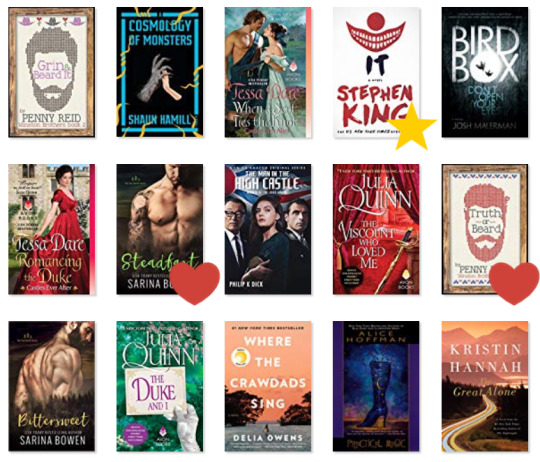
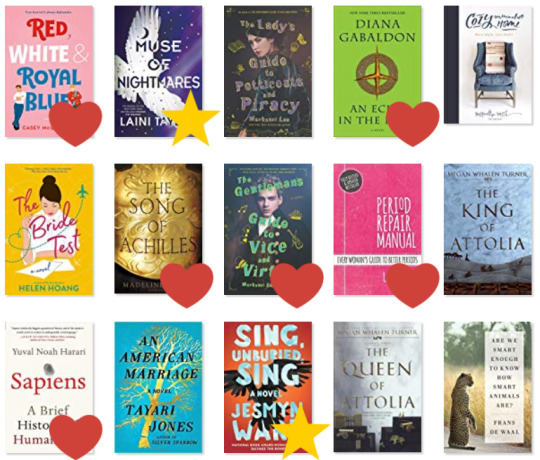
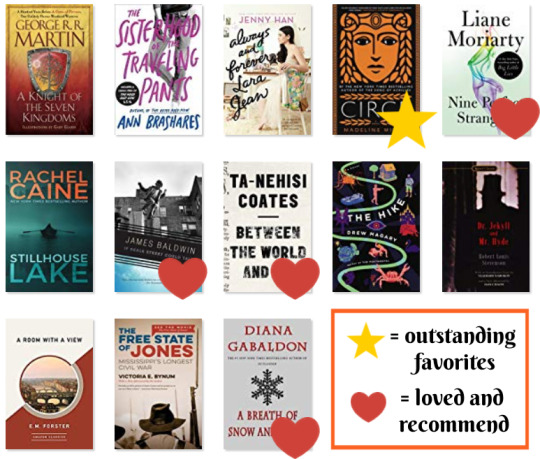
These are the 43 books I read in 2019 (full list under the “keep reading”). The books with gold stars are the ones I rated 5-stars. The books with hearts are 4-star reads, which means I really loved them and would recommend them. Here are some highlights...
Outstanding Audiobook Narration
Perdita Weeks reading Circe by Madeline Miller & Christian Coulson reading The Gentleman’s Guide to Vice and Virtue by Mackenzi Lee
It’s a tie! I can’t decide which of these narrators I loved more. Finding the right voice for a character is difficult, but Weeks and Coulson were perfect matches for Circe and Monty. When the narration is just right, an audiobook can feel immersive, and that’s what these books were for me - immersive experiences. I didn’t write a review for Circe (what can I say except it was amazing!), but you can read my short review for The Gentleman’s Guide here.
Worthy of Its Critical Acclaim and Many Awards
Sing, Unburied, Sing by Jesmyn Ward
Ward, a Mississippi author, has been on my radar for years, but this is the first of her books I’ve read. I gave only four books 5-star ratings this year, and this was one of them. I didn’t get around to writing a full review, but in my ‘notes’ I wrote: This was haunting in a strangely uplifting way.
Out of My Comfort Zone
It by Stephen King
In 2018, I stepped out of my comfort zone when I read a couple of contemporary Romance novels. This year, I stepped out of my comfort zone with Horror. I have avoided the Horror genre in the past because I’m easily scared. But, It was not that frightening and 5-stars good. Read my review here.
Notable Nonfiction
Sapiens: A Brief History of Humankind by Yuval Noah Harari, Period Repair Manual by Lara Briden, & Cozy Minimalist Home: More Style, Less Stuff by Myquillyn Smith
All three of these books stand out for different reasons. Sapiens was surprisingly fascinating and engrossing. Period Repair Manual was an eye-opening read with helpful, actionable advice (my review here). Cozy Minimalist Home was an attitude-changer and I really appreciated Smith’s design-conscious approach to minimalism.
Comforting and Cozy
A Breath of Snow and Ashes, An Echo in the Bone, & The Fiery Cross by Diana Gabaldon
In 2018 I reread Drums of Autumn and fell in love with Outlander again. This year, I continued the series with books 6 & 7 and started rereading book 5. I haven’t finished The Fiery Cross, yet, so technically it shouldn’t be included here. But, I did read more than 80% of it in the last quarter of the year. I’m loving being in this world, with these characters, again. These books are long and it takes me forever to read them, but there’s something comforting about all the details and descriptions of the seemingly mundane. Written in My Own Heart’s Blood & Go Tell The Bees That I Am Gone are in the pipeline for 2020.
Honorable Mentions
Nine Perfect Strangers by Liane Moriarty & Muse of Nightmares by Laini Taylor
It saddens me that Moriarty’s books are pigeonholed as ‘Chick Lit’ (a genre classification that I abhor). Her books are so, so good and all genders should be reading them. I personally don’t understand why so many of her devoted readers didn’t like Nine Perfect Strangers as much as her other novels. It was different, but I still thought it was hilarious, entertaining, and heartfelt—descriptors that could be used for many of Moriarty’s books.
Muse of Nightmares is Taylor’s follow-up to Strange the Dreamer, one of my favorites from 2017. This young adult, fantasy duology is so colorfully and beautifully written. If you’re looking for fantasy books, but don’t want to commit to a long series, I highly recommend these. The world-building is amazing, the characters are multi-faceted, and the story’s conclusion is satisfying.
Best Cover Art

The Full List of Books (Titles and Authors) I Read in 2019:
Note: This list is in chronological order, starting with the book I finished first this year. The graphic at the top of this post is in reverse chronological order, starting with the book I finished last.
A Breath of Snow and Ashes by Diana Gabaldon ♥
The Free State of Jones: Mississippi’s Longest Civil War by Victoria E. Bynum
A Room with a View by E.M. Forster
The Strange Case of Dr. Jekyll and Mr. Hyde by Robert Louis Stevenson
The Hike by Drew Magary
Between the World and Me by Ta-Nehisi Coates ♥
If Beale Street Could Talk by James Baldwin ♥
Stillhouse Lake by Rachel Caine
Nine Perfect Strangers by Liane Moriarty ♥
Circe by Madeline Miller ★
Always and Forever, Lara Jean by Jenny Han
The Sisterhood of the Traveling Pants by Ann Brashares
A Knight of the Seven Kingdoms by George R.R. Martin
Are We Smart Enough to Know How Smart Animals Are? by Frans de Waal
Queen of Attolia by Megan Whalen Turner
Sing, Unburied, Sing by Jesmyn Ward ★
An American Marriage by Tayari Jones
Sapiens: A Brief History of Humankind by Yuval Noah Harari ♥
The King of Attolia by Megan Whalen Turner
Period Repair Manual by Lara Briden ♥
The Gentleman’s Guide to Vice and Virtue by Mackenzi Lee ♥
The Song of Achilles by Madeline Miller ♥
The Bride Test by Helen Hoang
Cozy Minimalist Home: More Style, Less Stuff by Myquillyn Smith ♥
An Echo in the Bone by Diana Gabaldon ♥
The Lady’s Guide to Petticoats and Piracy by Mackenzi Lee
Muse of Nightmares by Laini Taylor ★
Red, White, & Royal Blue by Casey McQuiston ♥
The Great Alone by Kristin Hannah
Practical Magic by Alice Hoffman
Where the Crawdads Sing by Delia Owens
The Duke and I by Julia Quinn
Bittersweet by Sarina Bowen
Truth or Beard by Penny Reid ♥
The Man in the High Castle by Philip K. Dick
The Viscount Who Loved Me by Julia Quinn
Steadfast by Sarina Bowen ♥
Romancing the Duke by Tessa Dare
Bird Box by Josh Malerman
It by Stephen King ★
When a Scot Ties the Knot by Tessa Dare
A Cosmology of Monsters by Shaun Hamill
Grin and Beard It by Penny Reid
3 notes
·
View notes
Text
If Beale Street Could Talk
Barry Jenkins’ If Beale Street Could Talk (2018) is one of the most stunning and heartbreaking movies I have seen in a long time. I was struck by how well it tied in with a lot of the big concepts we have been talking about thus far in the course, most clearly with the ideas of Platonic love and the ladder of love. The film is explicitly concerned with physical love and how sex factors into a relationship.
Tish, in her narration as well as in her normal dialogue, talks about the connection that she and Fonny share—both emotional and physical. Early on, she talks about how they had bathed together as children, how she had “dumped water over Fonny’s head.” This image is so interesting to me because it calls up the concept of baptism. Baptism is an act of purification and it often accompanies name-giving when performed on children. It is as though Tish purified Fonny in that moment as kids, just as she does now. She spends the film trying to clear Fonny’s name. It is also, obviously, a religious ceremony. The sharing of this religious moment between them points to Tish’s feelings of emotional connection to Fonny—a connection far more profound than the physical. She goes on to say “I don’t remember that we had any curiosity concerning each other’s bodies. Fonny loved me too much. And that meant that there had never been any occasion for shame between us.” Their emotional connection is not only more profound than their physical connection, it also precedes it. We live in a world in which the opposite is often true, and even in the ladder of love, it is the love of beautiful bodies that comes first. For these two, they start at the top of the ladder. This is reinforced by the idea that Fonny loved her too much to be curious about her body—as though they are already beyond that kind of love. Tish also ties shame to physical love. This is another Biblical reference—Adam and Eve ate from the tree of knowledge and realized they were naked, and they were ashamed. Fonny and Tish are like Adam and Eve before they eat the apple. They are unashamed, but also ignorant. Naïve. I think that continues throughout much of the film. They live in their own perfect world, but when other people invade that world, that is when things start to go wrong. More on this later, I want to talk about all the 4th wall breaks, but first I want to finish talking about the scene at hand.
Tish goes on to say, “We were a part of each other, flesh of each other’s flesh, which we so took for granted that we never thought of the flesh.” This is a clear reference to Aristophanes myth of the origin of love—Tish and Fonny are two halves of a whole. But, they are somewhat divorced from their bodies. They are soulmates. Their love transcends the physical altogether, to the point that they are simply unconcerned with. However, this is not always the case. When they do finally have sex, Tish seems afraid. Fonny consoles her by telling her, “I belong to you.” This is a very interesting inversion of the typical attitude around virginity (and Tish is a virgin before Fonny)—that for a man to have sex with a woman is to take something from her, to possess her in some way. But, in this moment, it is Tish who takes a part of Fonny (which, not to be crude, is a more accurate rendering of what happens during the action of sex, isn’t it?). He later asks her if she likes it when he makes love to her, and she dodges the question. When he presses the issue, she responds, “I just know that I love you.” She does not seem particularly enthused by sex, perhaps because she sees it as unnecessary or secondary to loving Fonny. It is Fonny who is more interested in sex and in the physical generally. After all, he is a sculptor. He communicates through the physical, through objects he can make with his hands. In fact, Tish first knew Fonny was in love with her when he gave her mother and sculpture he had made. Baldwin, in most of his novels, is extremely concerned with sex and how people engage with each other physically. In the article we read this week, “Baldwin and the Occasion of Love” by Christopher Freeburg, Freeburg brings up a quotation from Soren Kierkegaard, “Love’s hidden live is in the innermost being, unfathomable, and then in turn is an unfathomable connectedness with all existence” (191). This is a sort of Platonic take on love: the idea that love eventually extends to all beautiful things, namely the forms. Freeburg claims that “Baldwin fashions a similar vision through a relentless commitment to the individual’s materiality—through nakedness, sex, and a mysterious vulnerability. Baldwin’s version of ‘all existence’ is materialized as the texture of history…” (191). I think Jenkins is extraordinarily true to this Baldwinian view of love in his adaptation. Tish and Fonny are at once ethereal and physical. Fonny, in particular, seems able to access the ethereal via the physical. And, of course, it is crucial that we, the audience are able to access the internal lives of these characters via film, an inherently physical medium.
So! To loop around to what I wanted to talk about earlier: the dozens of times this film breaks the 4th wall. As I mentioned earlier, things go wrong for these characters when other people, situations, circumstance invade their private world—when the serpent enters Eden, as it were. But, we are invading their private world just by watching this movie, and Jenkins wants us to feel that. These characters are constantly talking to the lens (and, by extension, us) during otherwise typical moments of dialogue. This places the audience, quite literally, in the character’s shoes. The first instance of this happens when Tish tells her mother that she is pregnant. We are not made to simply watch Tish as she tells her mother this news. We, too, must look into Tish’s anxious eyes. We, too, are forced to endure her mother’s expectant gaze.
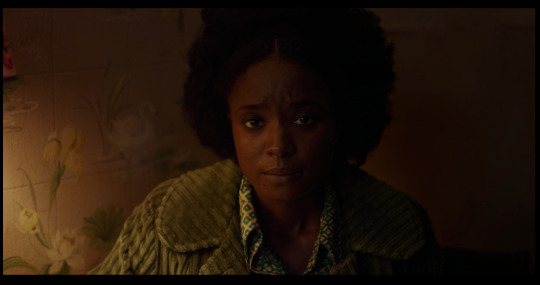
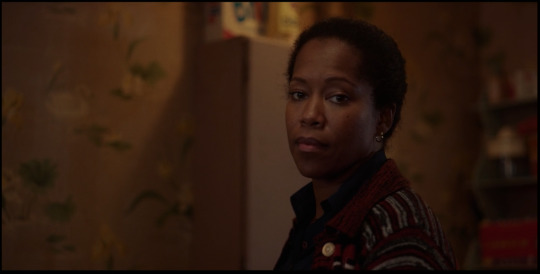
This kind of camera work is an exercise in empathy, but also in voyeurism. It forces us to ask ourselves: what right do we have to bear witness to this story? To these private moments between characters? Another example that stands out to me is when Tish looks into the camera over Fonny’s shoulder while the two have sex. It is extremely uncomfortable, and it also makes us consider why normal sex scenes without 4th wall breaks don’t bother us. Shouldn’t that be just as uncomfortable to watch? But no, it is only when someone looks back at us that we become aware of our position as voyeur. In that way, the movie is emphatically confrontational. It is refusing to sit back and be watched. It watches us back.
To conclude, If Beale Street Could Talk is a movie interested in questions of physicality, spirituality, and intimacy, among many, many other things that I, unfortunately, do not have the time or space to cover. It is always a joy to watch such a rich and carefully constructed film. I will not be forgetting it soon.
3 notes
·
View notes
Text
Best Films of 2018: Honorable Mentions
The time, once again, has come. The Oscars nominations are out there, and they’re ... puzzling ... But anyone interested in an alternate take can look no further.
The cinema of 2018 offered too many notable treasures to whittle down to a simple list of ten, so before we get into the meat of my countdown, here is an alphabetical list of ten films that just missed out on making my list, but are essential viewing for anyone looking to take in the best that 2018 had to offer.
Enjoy!
Blindspotting (dir. Carlos López Estrada)

I’m still waiting for the moment when the world collectively discovers the thing at which Daveed Diggs is not amazing. He had already garnered acclaim as a part of the experimental hip-hop group clipping. before reaching a wider audience and netting himself Grammy and Tony Awards for his role in the paradigm-altering musical, Hamilton. To that already distinguished list, we can now add co-writing and co-starring in one of 2018’s most original films. Blindspotting, set in Digg’s hometown of Oakland, CA, is a searing take on gentrification, racism, and police brutality that show off a deep understanding of the myriad political problems in the rapidly-changing Bay Area, while displaying an equally deft touch with the characters who find their lives irreparably damaged as a direct or indirect result. It’s impressive work from Diggs and co-writer/co-star Rafael Casal that first-time director Carlos Lopez Estrada brings to life with singular vision. Something tells me we’ll continue to see more of everyone involved, but Diggs is undoubtedly headed for greatness.
The Death of Stalin (dir. Armando Iannucci)
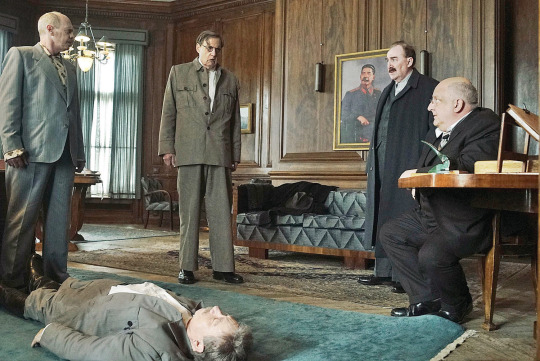
You’d be forgiven if you thought the creator/director of Veep, The Thick of It, and In The Loop had already mined politics’ deepest, darkest depths for the pitch-blackest comedy that one could possibly generate from the toxic combination of bureaucratic incompetence and egotistical narcissism. However, as The Death of Stalin shows with brutal precision, you would be wrong. The Death of Stalin is at times so bleak its difficult to even describe as a comedy without a bit of a cringe on your face, but it revels brilliantly in the theater of the absurd and probes ruthlessly at the ruling class with chilling contemporary resonance. And that’s all without mentioning that it features one of the best ensemble performances of the year. In a time when its easy to despair how much our everyday political reality has started to resemble a particularly discomfiting episode of Veep, Iannucci makes a triumphant return with an even more discomfiting message - never forget, things can always get much, much worse.
Hereditary (dir. Ari Aster)
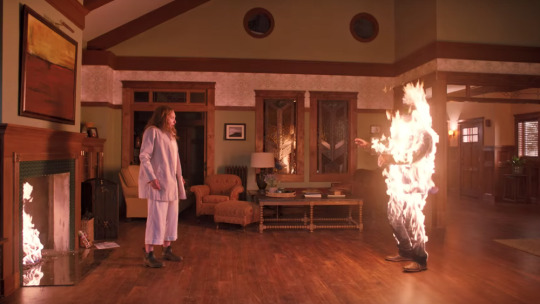
Another year, another Sundance horror breakout. Even if it doesn’t quite match up with some of its more distinguished predecessors (I wouldn’t quite put it at the level of It Follows, The Babadook, or The Witch) Hereditary is clearly the year’s best horror film, featuring a handful of sequences sure to push you to the edge of your seat, and then keep you up at night. The perennially under-appreciated Toni Collette delivers a performance of such vast emotional range that it deserves mention among the absolute best performances of the year – which, of course, meant that it was doomed to be ignored by the Oscars. Nevertheless, any fans of the genre should stop what they’re doing (including, presumably, reading this list) and watch this film immediately. You won’t be sorry.
If Beale Street Could Talk (dir. Barry Jenkins)
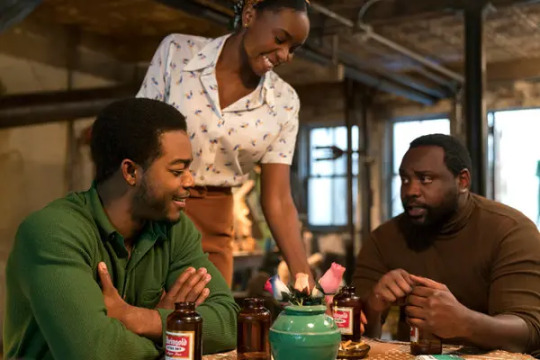
A pairing like Barry Jenkins and James Baldwin makes so much sense, and has such immense creative potential, that it’s generally something that could exist only in cinephile dreams. It simply makes *too* much sense. Yet, here we are, and Jenkins’ follow-up to the critically-revered Moonlight, an adaptation of one of Baldwin’s lesser-known novels, If Beale Street Could Talk, is very much real. Does it measure up to the immense expectations thrust upon it, due in no small part to Moonlight’s rapturous reception and the much-hyped pairing of Jenkins and Baldwin? In some important ways, no. Is Jenkins’ script at times overly-reverent of its source material? In some important ways, yes. But when Jenkins filters Baldwin’s story of the redeeming power of love in the face of oppression through his own unique cinematic voice, the results are breathtaking. Jenkins remains one of cinema’s greatest emerging artists.
Mission: Impossible – Fallout (dir. Christopher McQuarrie)
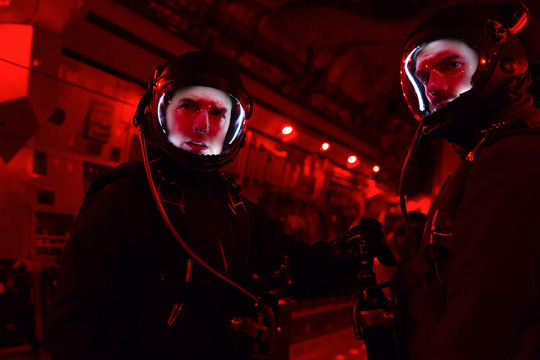
At the very least, this latest installment in the M:I franchise was the most balls-to-the-wall fun I had in a theater this entire year, hurtling at a breakneck pace from one jaw-dropping set piece to the next with one of the world’s biggest stars carrying the screen from the first frame to the last. But at most, you could call it one of the decade’s best action films, with some of the most breathtaking stunt work ever put to film with an absolutely singular star who continues to push his penchant for cheating death and tempting fate for our entertainment to daring new heights. The truth probably lies somewhere between the two extremes, but either way, the Cruise’s latest ride as Ethan Hunt is undeniably one of the most thrilling yet.
Private Life (dir. Tamara Jenkins)

With 11 years having passed since her Oscar-nominated feature debut, The Savages, hit the silver screen, news that Netflix was financing and developing a new film from Tamara Jenkins was met with nearly unbridled optimism. More than delivering on that promise, Jenkins once again delivered a film that delves deeply into all-too-common but dramatically under-explored modern adult experiences. While The Savages followed two adult siblings dealing with the mental decline of their elderly parent, Private Life details a couple in their 40s going through fertility treatments. Like her debut, Private Life uses this trying, even destabilizing experience to explore the ways in which our long-established adult lives can be uprooted as much by our own choices as by external, unforeseeable events. With two sterling performances from Kathryn Hahn and Paul Giamatti at its center, Private Life is rife with incisive observations about overlooked truths of aging together. It’s beautiful work, and undoubtedly one of Netflix’s best “original” offerings.
The Rider (dir. Chloe Zhao)

Using a cast of untrained actors to spin a poetic tale lost opportunity by way of the American rodeo, director Chloe Zhao’s sophomore feature has keyed her as a rising master of cinematic realism. The film follows the struggles of a former rising rodeo star dealing with the fallout of a traumatic head injury suffered during a bronc riding competition, and mirrors the real-life experiences of its star, Brady Jandeau. who Zhao befriended while shooting her debut feature, Songs My Brothers Taught Me. Drawing out brilliant performances and setting them against the perma-golden picturesque of the Badlands, The Rider is a testament to what truly independent cinema is capable of and is sure to springboard Zhao to greater heights.
Spider-Man: Into the Spiderverse (dir. Bob Persichetti, Peter Ramsey, Rodney Rothman)
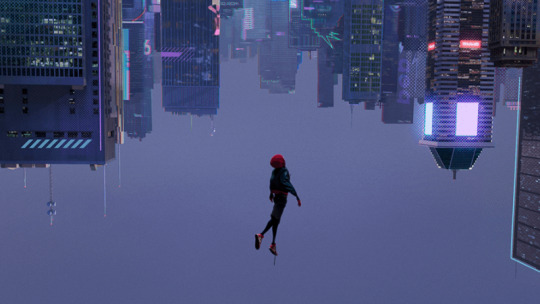
The most unexpected triumph of the year, Spider-Man: Into the Spiderverse is not just a high watermark in the Spider-Man film series, it is almost certainly the best film to ever come out of Marvel Studios, and possibly the greatest superhero film since The Dark Knight. With an airtight script that spans several universes (literally) with ease, and featuring some of the most glorious and inventive animation ever to grace the big screen, Into the Spiderverse is a rare and perfect marriage between the words on the page and the visual language employed on screen. It a testament to what’s possible when talented artists with an original vision take big risks - it’s a breath of fresh air.
A Star is Born (dir. Bradley Cooper)
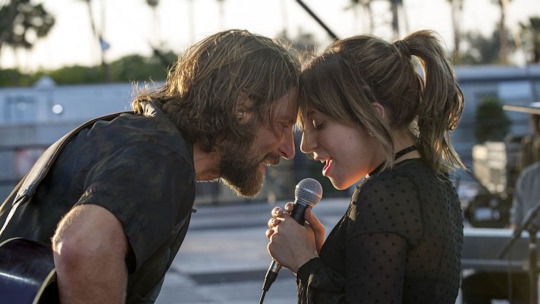
Even with an improbably underwhelming Oscar campaign sputtering its way to the finish line, it’s hard not to peg A Star is Born as the year’s most-talked about film. Bradley Cooper brought his gestating passion project to life with scope and vision rarely seen from a first-time director and Lady Gaga turns in an absolutely electric performance that elevates the film whenever she’s on screen. From the spine-tingling live concert scenes to the beautiful on-screen chemistry between Cooper and Gaga, there’s an awful lot to love about this latest iteration of this long-tenured Hollywood classic. Sure, there’s also plenty to nitpick at - obviously more than enough to fuel a backlash against the once-assumed Oscar frontrunner - but when this film is firing on all cylinders, it’s right up there with the greatest cinema of 2018. Cooper is officially a filmmaker to watch, and A Star Is Born looks every bit like a directorial debut that will stand the test of time.
You Were Never Really Here (dir. Lynne Ramsey)

One of the year’s most boldly-directed films, Lynne Ramsey’s latest is a lean thriller that goes for your throat but takes up permanent residence in your gut. Ramsey and star Joaquin Phoenix (delivering yet another show-stopping performance) bury you deep inside the mind of killer for hire, traumatized by his abusive childhood and haunted by his military past, as he embarks on a job to rescue a young girl from sex traffickers. If this premise seems familiar, believe me, the execution is anything but. Ramsey’s direction is unerringly brilliant, elevating You Were Never Really Here well beyond it’s pulpy origins to bracing, almost hallucinogenic heights. Oh, and did I mention it boasts one of Jonny Greenwood’s most adventurous scores to date? If that’s not enough to get it in your Amazon Prime queue (hint hint), then I don’t know what to tell you ...
#Best Films of the Year#best movies of the year#film#cinema#you were never really here#lynne ramsay#joaquin phoenix#a star is born#bradley cooper#lady gaga#spider man into the spider verse#the rider#chloe zhao#private life#tamara jenkins#paul giamatti#kathryn hahn#mission impossible fallout#tom cruise#christopher mcquarrie#if beale street could talk#barry jenkins#brian tyree henry#regina king#hereditary#ari aster#toni collette#the death of stalin#armando iannucci#blindspotting
20 notes
·
View notes
Text
The Best Films of 2018
Top 10 Films of the Year:

1. ROMA (Netflix)
If I harbored any doubt that Alfonso Cuarón was among the greatest filmmakers/storytellers of this (or last) century, it was forever dispelled with Roma. Cuarón’s hyper-naturalistic memoir reveals the thorny relationships between employers, caregivers, and those who receive care. It possesses a kind of clarity, maturity, and tenderness that only comes with distance and time. As it communicates the innumerable intersections of and parallels between ethnicity, class, and gender, it neither rushes nor exaggerates and romanticize, which is quite commendable considering just how visually rapturous Cuarón’s execution is. Moreover, he does so without pontificating or criticizing. Some of the film’s detractors claim it’s an elitist exaltation of domestic workers; I find that assertion unfair, for it would require a larger conversation about who is able to represent whom. I believe Cuarón respectfully illuminates and savors the mundane for therein lies the clandestine miracles of life. It’s clear he has so much love for the ghosts of long ago. Roma is a paean celebrating and lamenting all the pains and pleasures that usher us through any given year. (Watch the trailer.)
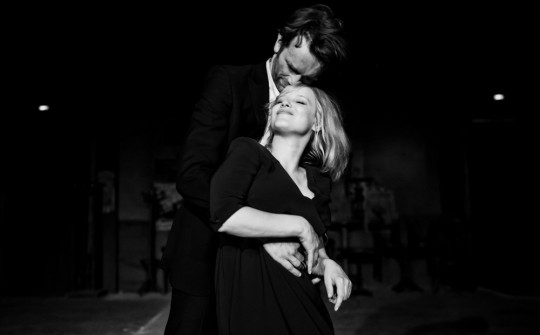
2. COLD WAR (Amazon Studios)
Sexy, sad, and everything in between, Paweł Pawlikowski’s Cold War chronicles a nearly two decade-long love affair between Wiktor - an accomplished music director - and Zula - a rising singer - in a world in threat of extinction. The film examines the violation of cultural identity and the mechanism of war which thwart any attempt to preserve authenticity. Epic and tactfully sparse in equal amounts, the film is comprised of unbearably terse episodes peppered over fifteen years. Thus, we are only privy to fragments of the characters’ tumultuous timeline together. Within the interlude – between each passionate episodes - Pawlikowski brilliantly employs subtext and chilly atmospheric tension to sustains the pair’s longings – and subsequently preserves our infatuation with them. Cold War is a rich love story swathed in bitterness. By the end, we can’t help but envy, pity, and mourn each part of Wiktor and Zula’s hot-blooded romance. (Watch the trailer.)

3. THE TALE (HBO Films)
The Tale is a work in progress. I say this without insult but unrestrained admiration. Documentarian Jennifer Fox’s devastating filmic memoir about childhood sexual assault is personal exercise in understanding deeply entrenched trauma. Much of the film’s approbation notes its nuanced handling of difficult thematic material and Dern’s towering yet understated performance, but Fox’s haunting lyricism – the way she manifests a cinematic conversation between her present self and her younger self from dispersed memories – makes this film a formal and aesthetic triumph just as much as a cultural watershed.
Initially, I questioned how “accurate” the film’s conclusion was. Did the events unfold with the same amount of understated poetic justice? Did Fox have the opportunity for confrontation and vindication as depicted? I realize that asking for explication undercuts the power of Fox’s investigation and exemplary subjectivity. The film itself is an act of introspective healing. As harrowing as The Tale is, it is essential viewing. (Watch the trailer.)
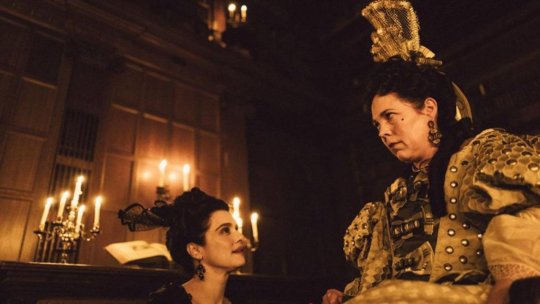
4. THE FAVOURITE (Fox Searchlight Pictures)
I’m still quite ambivalent towards the film’s nauseating photography, but make no mistake; The Favourite is the best writing and acting you’ll witness this year. While Lanthimos other films (Dogtooth, The Lobster, and The Killing of a Sacred Deer) are the superlative statements on the auteur’s résumé – perhaps in part because he also penned them – his dark, stomach-churning talents certainly lend themselves well to this gleefully filthy farce. The deliciously dicey sexual politics between the characters provides a scathing critique of class, decorum, regal period pieces, and the current political climate on a grand scale. The trio’s absurd antics keep the film alive with color and candor, but film’s lasting impact comes with the glimmers of profound sadness laced within Olivia Colman’s performance as the sovereign. Colman, one of the finest living actors, carefully vacillates between her character’s illogical command and her surprising frailty. The Favourite typifies the best kind of satire: deliciously catty as it plays out with a melancholic sting in its aftermath. (Watch the trailer.)
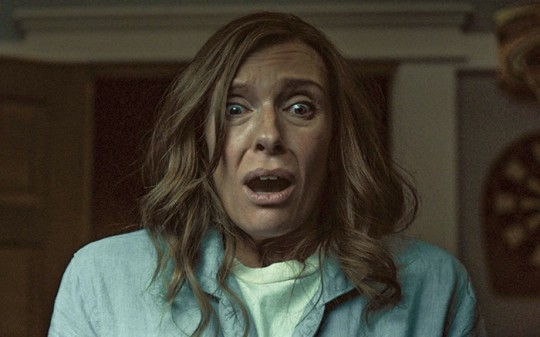
5. HEREDITARY (A24)
Balance is key in life – and because we’ve relished the delectable delights of Mary Poppins Returns and Paddington 2, a hearty dose of uncompromising nihilism is also imperative. Hereditary more than excels in that role. It is a grotesque descent into unimaginable horror led by Toni Collette in a game-changing performance. Following films like Antichrist (2009), Babadook (2014), The VVitch (2015) and this year’s equally terrific and terrifying The Haunting of Hill House series, Hereditary marks an apex in the horror subgenre exploring the connection between loss and dread. It’s aware of the genre’s robust history. Consequently much of its success lies in its perceptive ability to draw from other classics like Rosemary’s Baby, Don’t Look Now, and The Exorcist while continuing to probe the complexities of grief and unconscious shame. (Watch the trailer.)

6. YOU WERE NEVER REALLY HERE (Amazon Studios)
Had the titles not already been taken, You Were Never Really Here could have easily be called “Making a Murderer,” “Gone Girl,” or “Vengeance Is Mine.” Lynne Ramsay’s follow-up to We Need to Talk About Kevin follows a damaged antihero hired to rescue trafficked girls. Her The story’s presentation is so lean and alienating that it’s difficult to ever form a comprehensive understanding of merciless world the characters inhabit. The violence is graphic, however Ramsey rarely shows the actual acts as they are committed. Instead, she takes us through static terrains in the wake of horrific brutality. Her juxtaposition of overwhelming ambient noises creates a particularly affecting cacophony. Surreal, distressing, yet oddly tender and uplifting, You Were Never Really Here confirms once again that Ramsay is an artist of the highest order. (Watch the trailer.)

7. EIGHTH GRADE (A24)
Bo Burham’s Eighth Grade a wonder to behold – that is, if you can endure an utterly distressing experience to endure. Eighth Grade’s young heroine, Kayla, navigates the frightening contours of adolescence. During my initial viewing of Eighth Grade, it felt like a slideshow of memories from the most repellent stages of childhood. I only allowed myself to recognize it all at a distance – perhaps a self-induced safety mechanism – as if all of it existed in a half-remembered past. Revisiting the film months later, it felt startlingly indicative of not only my eighth grade year but every year of life. If we cut through the handful of distinct aches of puberty, I’m really not so different now than I was at age thirteen – though Kayla is perhaps a bit less polished. What’s more, Kayla’s anxieties, comforts, and hopes function the same way mine do now. Burham’s film brims with compassion, so it’s easy to see - and feel - that eighth grade wasn’t that long ago. (Watch the trailer.)

8. IF BEALE STREET COULD TALK (Annapurna Pictures)
Fear begets fear... until it eats the soul. Barry Jenkins’ adaptation of James Baldwin’s novel is a exquisite study of how fear - internalized and externalized - leads to systematic racism and discrimination. As Baldwin and Jenkins reveal, the only remedy to combat this fear is love – and there’s so much of it in and around Beale Street. (Perhaps Donnie Darko’s Jim Cunningham and his simplistic binary theory were actually prophetic?) It’s difficult to examine Jenkins’ expertise without acknowledging his stylistic and thematic influences – specifically Wong Kar-wai and his intoxicating visual romanticism and Douglas Sirk and his flair for weepy melodrama. Yet even as glimmers of other great works shine through Beale Street, Jenkins contributes his own unique voice to the pantheon of Cinema. Using Baldwin’s poignant prose as a template, he blends the conventions of great American stage plays with docudrama tenets to craft a vast universe of feeling. Furthermore, If Beale Street Could Talk is evidence that Moonlight certainly wasn’t a fluke. (Watch the trailer.)

9. MARY POPPINS RETURNS (Disney)
It feels inappropriate to include such an imperfect movie among intimidating achievements like Roma and Cold War. Even with all its excessive schmaltz, saccharine sentiment and scenery-chewing cameos, Mary Poppins Returns represents a kind of homage I feared was entirely lost. Not so; I learned nothing’s gone forever, only out of place. Sure, the film’s nostalgic structure (or lack thereof), design, quips and songs are all aggressive imitations of a perfect cinematic and cultural touchstone, but the whole ordeal is just so beautifully flattering it’s impossible not to melt in its warmth. It reverently and earnestly reminds us just how lucky we are to have a classic like Mary Poppins to return to. It sends up and throws back to the pinnacle of the expansive (and now unforgivably carnivorous) Disney kingdom. As demonstrated here, indulging nostalgia from time to time can be quite healthy. Unlike most current family movies that pander to the lowest common denominator, Mary Poppins Returns transcends cynicism, pop iconography, and humor ingrained in the present moment. Although much of the film’s success is due to the collaboration of a surplus of talent, the film belongs to Emily Blunt. She, in fact, IS practically perfect as she evades mimicry and adds nuanced wit and benevolence. (Watch the trailer.)

10. MADELINE’S MADELINE (Oscilloscope Laboratories)
Madeline’s Madeline, an experimental coming-of-age thriller, is a film for those who care deeply about grueling and convoluted “artistic process.” It deftly walks a tight rope between satire and an earnest exploration of psychosis and performance – not unlike Bergman’s Persona or Lynch’s Mulholland Drive. Co-Writer/Director Josephine Decker fashions a platform for the fascinating newcomer Helena Howard; she reveals a rare kind of brashness and vulnerability in the title role. Alongside Howard, Molly Parker and the ever-brilliant Miranda July put their trust in Josephine Decker’s peculiar process. As such, they elevate and legitimize Madeline’s nightmare. There is palpable malice woven through the confounding narrative, though it is impossible to discern its primary source. Thematically, the film picks up the baton where Charlie Kaufman’s Synecdoche, New York left it, but Decker uses a film language loaded with obtuse codes and metaphors. Aesthetically, the film is something else entirely – more dangerous and anomalous than we’re comfortable seeing. And for that reason, it’s quite difficult to shake. (Watch the trailer.)

Another Praiseworthy 10 (in alphabetical order):
BEN IS BACK
BLACK PANTHER
BLACKkKLANSMAN
BURNING
CAN YOU EVER FORGIVE ME?
THE DEATH OF STALIN
LEAVE NO TRACE
SHOPLIFTERS
SPIDER-MAN: INTO THE SPIDER-VERSE
A STAR IS BORN
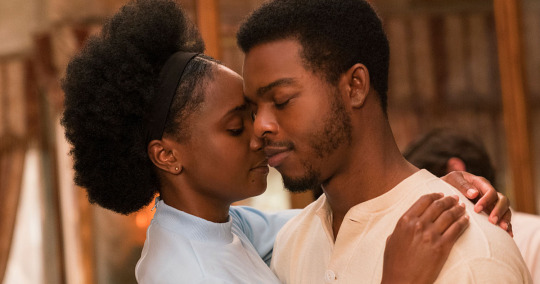
Best Direction:
1. Alfonso Cuarón for ROMA
2. Paweł Pawlikowski for COLD WAR
3. Lynne Ramsay for YOU WERE NEVER REALLY HERE
4. Barry Jenkins for IF BEALE STREET COULD TALK
5. Yorgos Lanthimos for THE FAVOURITE

Best Adapted Screenplays:
1. IF BEALE STREET COULD TALK
2. BLACKkKLANSMAN
3. BURNING
4. CAN YOU EVER FORGIVE ME?
5. BLACK PANTHER
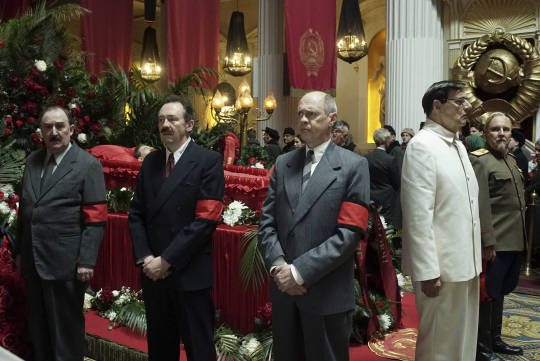
Best Original Screenplays:
1. THE FAVOURITE
2. SHOPLIFTERS
3. EIGHTH GRADE
4. THE DEATH OF STALIN
5. EIGHTH GRADE

Best Leading Actors:
1. Bradley Cooper in A STAR IS BORN
2. Ethan Hawke in FIRST REFORMED
3. Joaquin Phoenix in YOU WERE NEVER REALLY HERE
4. John David Washington in BLACKkKLANSMAN
5. Lucas Hedges in BEN IS BACK
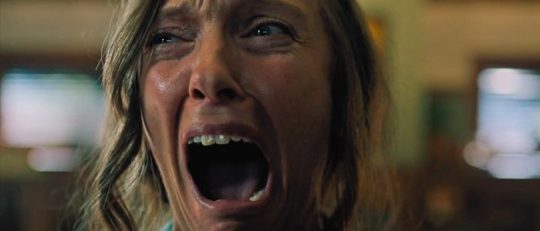
Best Leading Actresses:
1. Toni Collette in HEREDITARY
2. Olivia Coleman in THE FAVOURITE
3. Emily Blunt in MARY POPPINS RETURNS
4. Laura Dern in THE TALE
5. Yalitza Aparicio in ROMA
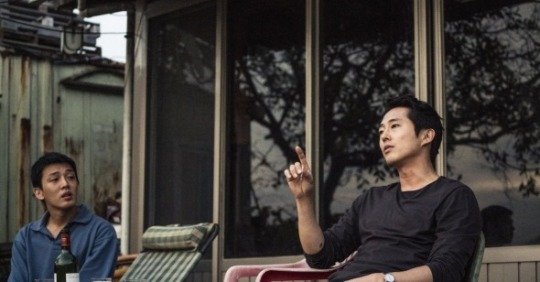
Best Supporting Actors:
1. Timothee Chalamet in BEAUTIFUL BOY
2. Steven Yeun in BURNING
3. Richard E. Grant in CAN YOU EVER FORGIVE ME?
4. Adam Driver in BLACKkKLANSMAN
5. Josh Hamilton in EIGHTH GRADE

Best Supporting Actresses:
1. Natalie Portman in VOX LUX
2. Emma Stone & Rachel Weisz in THE FAVOURITE
3. Regina King in IF BEALE STREET COULD TALK
4. Amy Adams in VICE
5. Emily Blunt in A QUIET PLACE

Best Cinematography:
1. ROMA
2. COLD WAR
3. IF BEALE STREET COULD TALK
4. AT ETERNITY’S GATE
5. SUSPIRIA

Best Film Editing:
1. SUSPIRIA
2. BLACK PANTHER
3. FIRST MAN
4. ASSASSINATION NATION
5. WIDOWS

Best Sound Design:
1. YOU WERE NEVER REALLY HERE
2. FIRST MAN
3. A QUIET PLACE
4. ROMA
5. SUSPIRIA

Best Production Design:
1. SUSPIRIA
2. MARY POPPINS RETURNS
3. THE FAVOURITE
4. BLACK PANTHER
5. READY PLAYER ONE

Best Costume Design:
1. MARY POPPINS RETURNS
2. SUSPIRIA
3. THE FAVOURITE
4. BLACK PANTHER
5. IF BEALE STREET COULD TALK

Best Original Scores:
1. Marc Shaiman for MARY POPPINS RETURNS
2. Ludwig Göransson for BLACK PANTHER
3. Alexander Desplat for ISLE OF DOGS
4. Justin Hurwitz for FIRST MAN
5. Nicholas Britell for IF BEALE STREET COULD TALK
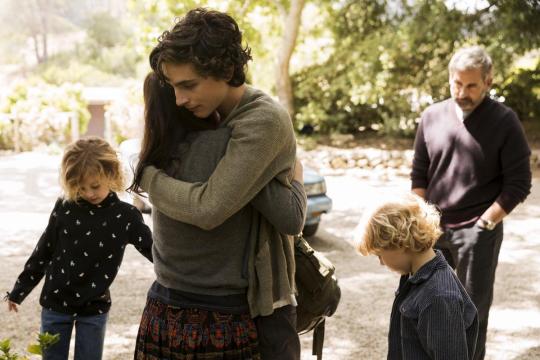
Best Original Songs:
1. “The Place Where Lost Things Go” from MARY POPPINS RETURNS
2. “Shallow” from A STAR IS BORN
3. “Suspirium” from SUSPIRIA
4. “All the Stars” from BLACK PANTHER
5. “Treasure” from BEAUTIFUL BOY
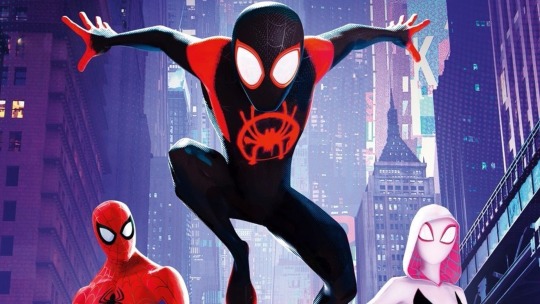
Best Animated Features:
1. SPIDER-MAN: INTO THE SPIDER-VERSE
2. ISLE OF DOGS
3. THE INCREDIBLES 2
4. MIRAI
5. RALPH BREAKS THE INTERNET

Best Acting Ensembles:
1. MARY POPPINS RETURNS
2. SHOPLIFTERS
3. BALCKkKLANSMAN
4. THE DEATH OF STALIN
5. A STAR IS BORN

2018′s Most Important Films:
1. THE TALE
2. SPIDER-MAN: INTO THE SPIDER-VERSE
3. BLACK PANTHER
4. INSTANT FAMILY
5. CRAZY RICH ASIANS

To commemorate Ingmar Bergman’s 100th Birthday (and a sold-out Criterion Collection boxset of 39 of his films), let’s recall his greatest works:
1. PERSONA
2. THE SEVENTH SEAL
3. CRIES & WHISPERS
4. WILD STRAWBERRIES
5. SHAME
6. FANNY & ALEXANDER
7. AUTUMN SONATA
8. THROUGH A GLASS DARKLY | WINTER LIGHT | THE SILENCE
9. SCENES FROM A MARRIAGE
10. THE VIRGIN SPRING
3 notes
·
View notes
Text
Bite-sized reviews
Brief thoughts on a few books that I wrapped up in the last month or so, with a quick portrait of the author!:
Wide Sargasso Sea, by Jean Rhys
I appreciate what this novel is meant to do–the alternate view of Bertha, the madwoman in the attic–but ultimately I was indifferent. I struggled to feel invested because there was honestly little of the protagonist to invest: things only happen to her, she never causes things to happen. I understand her past circumstances are an explanation of her present in Jane Eyre, but that fails to overcome my indifference given Jane’s own difficult circumstances, yet she still possesses an individual spark that allows her to overcome.
Rochester is appropriately creepy though. Gross.
If Beale Street Could Talk, by James Baldwin
An absolutely beautiful and exquisite portrait of fortitude and strength in the face of what seems to be too much to bear. I love how each line was so simple but articulated so much heart. I could feel the warmth, which was honestly perfect for the winter season. I initially read this to prepare for the movie, and now I MUST see it!! Someone come with me!!
1984, by George Orwell
I finally got around to reading this classic; I can totally understand why it has left such an indelible mark on our culture. I keep getting asked what I think about it compared to Brave New World, and while I personally enjoyed BNW more, 1984 IS STILL AN AMAZING WORK. It’s much more explicitly philosophical and doesn’t leave any interpretation up to the reader. It is staunchly and unashamedly presenting a view, which I’m about. I probably wouldn’t re-read it, but again, I appreciate the cultural education it provided.
Lincoln in the Bardo, by George Saunders
This was an interesting read, solely for the questions around unreliable narration, collage, interview styles, etc., and you know how much I love the debate of what IS a novel. I found the collective interview narration fascinating and really useful for sharing the stories of the characters, and expanding the world beyond Lincoln and his son. It is superficially about The President, but underneath it’s more like an incredible scrapbook of the things life is worth living for, and the things that make life hard to let go.
#prose#jean rhys#wide sargasso sea#james baldwin#if beale street could talk#george orwell#1980s#lincoln in the bardo#george saunders#bite sized book reviews#book reviews
3 notes
·
View notes
Photo

FRIDAY READS: GOLDEN GLOBES BOOKS
Nominations for the 76th annual Golden Globe Awards were announced on Thursday morning, December 6th, from the Beverly Hilton Hotel. Many of the nominees, in both television and film, are adaptations of Penguin Random House books. You can access the entire list of nominees at Variety.com. Sandra Oh and Andy Samberg will host the 2019 Golden Globes Awards on January 6th. Before then, we highly recommend reading the writing that gave rise to your favorite viewing:
FEATURE FILMS
IF BEALE STREET COULD TALK (Movie Tie-In) by James Baldwin
Nominated for: Best Motion Picture/Drama; Best Actress (Regina King); Best Screenplay
From one of our greatest writers, James Baldwin’s If Beale Street Could Talk is a profoundly moving novel about love in the face of injustice that is as socially resonant today as it was when it was first published. Told through the eyes of Tish, a nineteen-year-old girl, in love with Fonny, a young sculptor who is the father of her child, Baldwin’s story mixes the sweet and the sad. Tish and Fonny have pledged to get married, but Fonny is falsely accused of a terrible crime and imprisoned. Their families set out to clear his name, and as they face an uncertain future, the young lovers experience a kaleidoscope of emotions—affection, despair, and hope. In a love story that evokes the blues, where passion and sadness are inevitably intertwined, Baldwin has created two characters so alive and profoundly realized that they are unforgettably ingrained in the American psyche.
CRAZY RICH ASIANS (Movie Tie-In) by Kevin Kwan
Nominated for Best Motion Picture/Musical or Comedy
When Rachel Chu agrees to spend the summer in Singapore with her boyfriend, Nicholas Young, she envisions a humble family home and quality time with the man she might one day marry. What she doesn’t know is that Nick’s family home happens to look like a palace, that she’ll ride in more private planes than cars, and that with one of Asia’s most eligible bachelors on her arm, Rachel might as well have a target on her back. Uproarious, addictive, and filled with jaw-dropping opulence, Crazy Rich Asians is an insider’s look at the Asian jet set; a perfect depiction of the clash between old money and new money; and a fabulous novel about what it means to be young, in love, and gloriously, crazily rich.
THE OLD MAN AND THE GUN AND OTHER TALES OF TRUE CRIME by David Grann
Nominated for: Best Actor in a Motion Picture/Musical or Comedy (Robert Redford)
“The Old Man and the Gun” is the incredible story of a bank robber and prison escape artist who modeled himself after figures like Pretty Boy Floyd and who, even in his seventies, refuses to retire. “True Crime” follows the twisting investigation of a Polish detective who suspects that a novelist planted clues in his fiction to an actual murder. And “The Chameleon” recounts how a French imposter assumes the identity of a missing boy from Texas and infiltrates the boy’s family, only to soon wonder whether he is the one being conned. In this mesmerizing collection, David Grann shows why he has been called a “worthy heir to Truman Capote” and “simply the best narrative nonfiction writer working today,” as he takes the reader on a journey through some of the most intriguing and gripping real-life tales from around the world.
BOY ERASED: A MEMOIR OF IDENTITY, FAITH, AND FAMILY (Movie Tie-In) by Garrard Conley
Nominated for: Best Actor in a Motion Picture/Drama (Lucas Hedges)
The son of a Baptist pastor and deeply embedded in church life in small town Arkansas, as a young man Garrard Conley was terrified and conflicted about his sexuality. When Garrard was a nineteen-year-old college student, he was outed to his parents, and was forced to make a life-changing decision: either agree to attend a church-supported conversion therapy program that promised to “cure” him of homosexuality; or risk losing family, friends, and the God he had prayed to every day of his life. Through an institutionalized Twelve-Step Program heavy on Bible study, he was supposed to emerge heterosexual, ex-gay, cleansed of impure urges and stronger in his faith in God for his brush with sin. Instead, even when faced with a harrowing and brutal journey, Garrard found the strength and understanding to break out in search of his true self and forgiveness.
TELEVISION
SHARP OBJECTS (Movie Tie-In): A Novel by Gillian Flynn
Nominated for: Best Television Limited Series or Motion Picture Made for Television; Best Performance (Amy Adams); Best Performance/Supporting (Patricia Clarkson)
Fresh from a brief stay at a psych hospital, reporter Camille Preaker faces a troubling assignment: she must return to her tiny hometown to cover the murders of two preteen girls. For years, Camille has hardly spoken to her neurotic, hypochondriac mother or to the half-sister she barely knows: a beautiful thirteen-year-old with an eerie grip on the town. Now, installed in her old bedroom in her family’s Victorian mansion, Camille finds herself identifying with the young victims—a bit too strongly. Dogged by her own demons, she must unravel the psychological puzzle of her own past if she wants to get the story—and survive this homecoming.
A VERY ENGLISH SCANDAL: SEX, LIES AND A MURDER PLOT AT THE HEART OF ESTABLISHMENT by John Preston
Nominated for: Best Television Limited Series or Motion Picture Made for Television; Best Performance (Hugh Grant); Best Performance/Supporting (Ben Wishaw)
The behind-the-scenes look at the desperate, scandalous private life of a British MP and champion manipulator, and the history-making trial that exposed his dirty secrets. With the pace and drama of a thriller, A Very English Scandal is an extraordinary story of hypocrisy, deceit and betrayal at the heart of the British Establishment.
VULGAR FAVORS: THE HUNT FOR ANDREW CUNANAN, THE MAN WHO KILLED GIANNI VERSACE by Maureen Orth
Nominated for: Best Performance (Darren Criss); Best Performance/Supporting (Penelope Cruz and Edgar Ramirez)
Two months before Andrew Cunanan murdered the iconic fashion magnate Gianni Versace on the steps of his Miami Beach mansion, Maureen Orth was investigating a major story on the serial killer for Vanity Fair. Here, the award-winning journalist tells the complete story of Cunanan, his unwitting victims, and the moneyed, hedonistic world in which they lived and died—now the basis for the second season of American Crime Story, the FX television series.
THE HANDMAID’S TALE (Movie Tie-in) by Margaret Atwood
Nominated for: Best Performance (Elizabeth Moss)
A gripping vision of our society radically overturned by a theocratic revolution, Margaret Atwood’s The Handmaid’s Tale has become one of the most powerful and most widely read novels of our time. Offred is a Handmaid in the Republic of Gilead, serving in the household of the enigmatic Commander and his bitter wife. She may go out once a day to markets whose signs are now pictures because women are not allowed to read. She must pray that the Commander makes her pregnant, for in a time of declining birthrates her value lies in her fertility, and failure means exile to the dangerously polluted Colonies. Offred can remember a time when she lived with her husband and daughter and had a job, before she lost even her own name. Now she navigates the intimate secrets of those who control her every move, risking her life in breaking the rules.
For more information on these and related titles visit Golden Globes
5 notes
·
View notes
Text
barry jenkins was robbed!!!
if beale street could talk is the BEST book to movie adaption ever made fight me
this isn’t even really a win for blackkklansman its a win for spike lee’s career being constantly overlooked and i get it
but barry jenkins made the best adaption of a book ever done evey line every movement every frame every costume choice felt like a perfect continuation of james baldwin’s original novel and all of that started with barry jenkins’ screenplay
1 note
·
View note